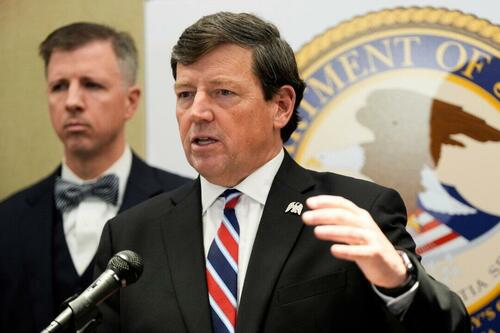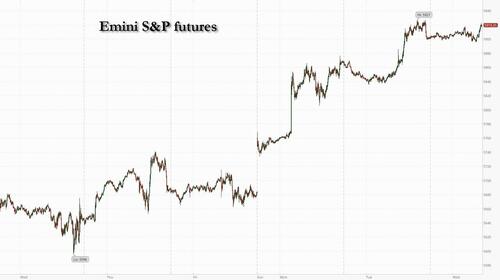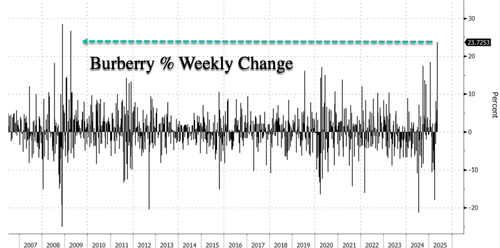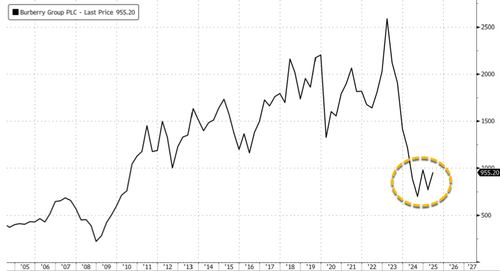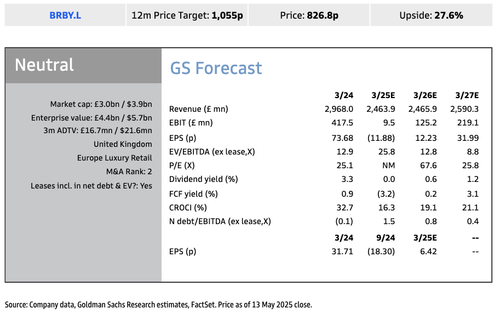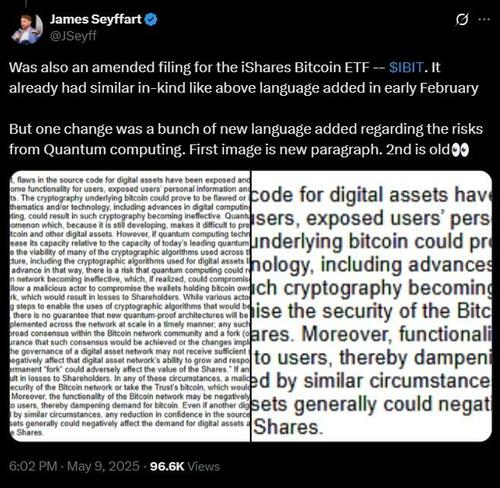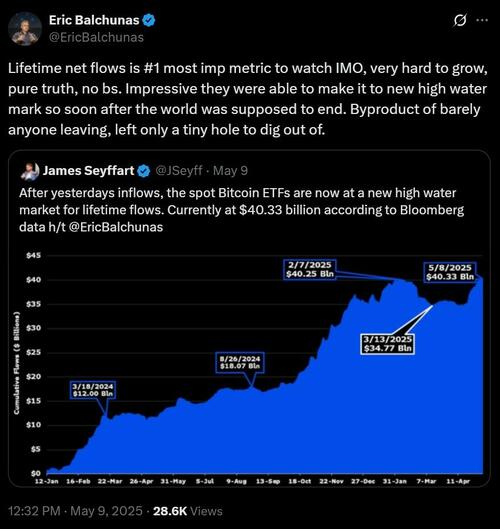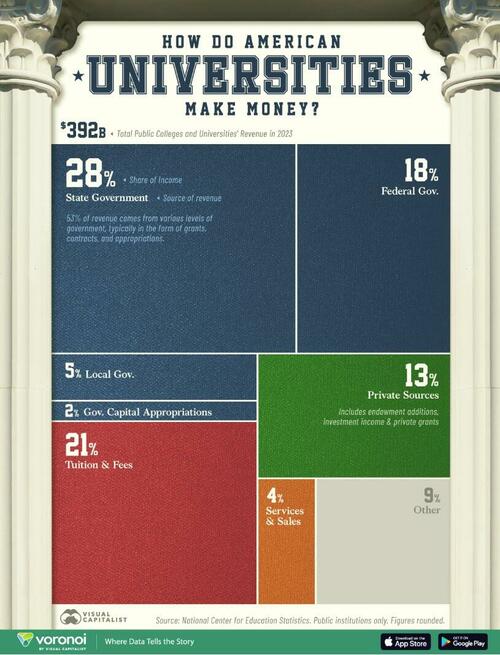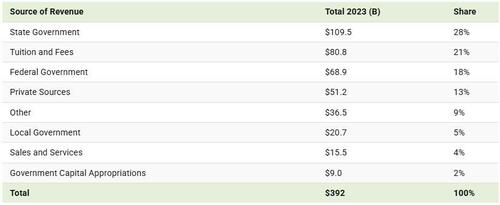A civilization inspired by a consumerist, anti-birth mentality is not and cannot ever be a civilization of love.
Distinction Matter - Subscribed Feeds
-
Site: Steyn OnlineMark takes questions from Steyn Club members around the planet...
-
Site: Steyn OnlineIf you missed today's edition of Steyn's Clubland Q&A live around the planet, here's the action replay...
-
Site: RT - News
The US will be “less and less” interested in the EU and UK in the coming years, the French president has warned
Western Europe must work to obtain strategic independence from the US because Washington will be disengaging from the continent as part of its ‘America first’ policy, French President Emmanuel Macron has said. He commented on the future of European-American relations in an interview with French broadcaster TF1 on Tuesday.
Since the start of his second term, US President Donald Trump has repeatedly blasted the EU and UK for being “terrible freeloaders,” accusing them of not contributing enough into NATO and “ripping off” America through unfair trade practices.
Last month, he said he would not even rule out withdrawing some or all of the 84,000 American troops currently stationed in Europe since Washington is not getting “reimbursed by much” for footing the bill for the continent’s security.
Macron told reporters that “we know that American interests will be less and less [focused] in Europe” in the coming years.
Read more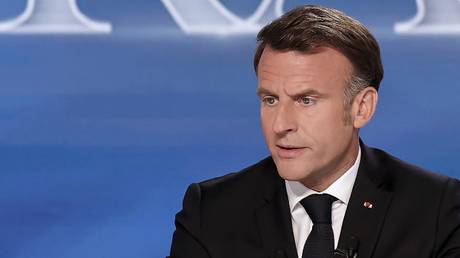 France can’t give Ukraine any more arms – Macron
France can’t give Ukraine any more arms – Macron
According to the French president, he and other Western European leaders “have known this for about 15 years.”
The signs of the US disengagement have been visible “since the US decided not to go into Syria with us, since they unilaterally withdrew from Afghanistan, and since what we have been experiencing in recent months,” he explained.
“It is ‘America first,’ and it is legitimate,” Macron said of the policies pursued by the Trump administration.
In such circumstances, it would be “irresponsible” if the region fails to gain strategic independence from the US within the next five to ten years, he stressed.
Trump’s latest attack on the EU came on Monday when he said that the bloc was “in many ways nastier than China.” The US President insisted that “they sell us 13 million cars; we sell them none. They sell us their agricultural products; we sell them virtually none,” adding that Brussels has also been “suing all our companies… Apple, Google, Meta.”
READ MORE: Ukrainians know they won’t get territory back – Macron
In early April, Washington imposed a sweeping 20% tariff on all EU goods and a 25% tariff on all car imports and metals. While Trump later announced a 90-day reprieve on most trade duties, a baseline 10% tariff and the aforementioned 25% tariff remain in force until an agreement on the issue is reached between the sides.
-
Site: RT - News
The US president has claimed that the super-luxury Boeing 747-8is a “gift from a Nation” to the federal government
US President Donald Trump has defended a gift of a $400mn million luxury jet to the US from Qatar, describing it as a “valuable asset” for the country.
The luxury liner will be handed to the Department of Defense and replace Air Force One, while the US government awaits on a replacement for the presidential jet from Boeing, delivery of which has been set back years by the troubled plane maker.
Trump is set to receive the super-luxury Boeing 747-8, known as the “flying palace,” from the Qatari royal family in what could become the most expensive gift ever given to the US by a foreign government.
In a post on his Truth Social platform on Tuesday, Trump insisted that the jet “is being given to the United States Air Force/Department of Defense.” It is a “gift from a Nation” to the US government “NOT TO ME!,” he wrote, claiming “only a FOOL” would turn it down.
Since the US had “successfully defended” Qatar for years, it should accept a free plane while “our new Boeings which are very late” remain grounded. Why should taxpayers foot the bill when a grateful ally was happy to reward America “for a job well done,” Trump argued? The savings, “naturally, would go to MAKE AMERICA GREAT AGAIN,” he concluded.
Read more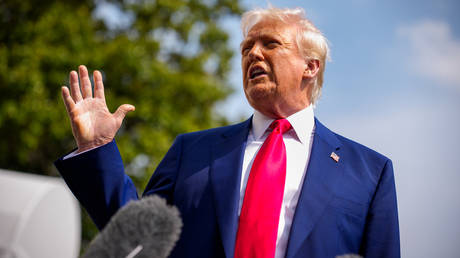 Trump rejects criticism over being gifted a Qatari jet
Trump rejects criticism over being gifted a Qatari jet
His remarks followed a day of red-carpet treatment by Saudi Arabia, the first stop on his first major overseas tour as president.
Trumps decision to accept the jet drew criticism from allies and opponents. The top Democrat on the House Oversight Committee, Jamie Raskin, labeled the deal “a grift.” Republican Sen. Ted Cruz said that the plane “poses significant espionage and surveillance problems.”
Critics also point to the awkward optics, legal murkiness, and the steep cost of outfitting the aircraft with the secure communications and classified systems needed to make it a functioning airborne White House.
The US Air Force’s contract with Boeing for two new Air Force One jets has been plagued by delays and soaring costs. Originally slated for delivery in 2024, the customized 747-8 aircraft are now expected to arrive as late as 2027 — or even 2028.
Shortly after his tour of the 747-8 plane Trump said he was “not happy with Boeing,” noting the contract was awarded “a long time ago” and hinting he might have to “buy a plane or get a plane, or something” to bridge the gap.
-
Site: PeakProsperityJoin Chris and Evie for the Signal Hour live at 1pm ET.
-
Site: PeakProsperityPremium members may join Chris and Evie for an extended version of the Signal Hour live at 1pm ET.
-
Site: RT - News
The meeting between the delegations from Moscow and Kiev lasted for less than two hours
The first direct talks between Moscow and Kiev in over three years have reportedly concluded at the Dolmabahce Palace in Istanbul.
The peace talks were initially planned to take place on Thursday. However, Vladimir Zelensky only named a Ukrainian delegation that evening, having spoken with Turkish President Recep Tayyip Erdogan in Ankara.
Kiev’s representatives eventually arrived in Istanbul on Thursday night and talks were rescheduled for Friday.
The Russian delegation was led by presidential adviser Vladimir Medinsky, who headed Moscow’s negotiating team at the failed 2022 Istanbul talks. The Ukrainian delegation was headed by Kiev’s defense minister, Rustem Umerov.
The talks follow a surprise invitation last Sunday from Russian President Vladimir Putin for unconditional talks on resolving the long-term root causes of the Ukraine conflict.
Zelensky, who had previously ruled out any talks with Moscow, only agreed to attend following US President Donald Trump’s announcement of his support for the talks, and his claim that Kiev should accept it “immediately.”
Putin’s spokesman announced on Thursday that the Russian president would not attend the talks, prompting the Ukrainian delegation to complain about the status of the Russian team.
Kiev unilaterally withdrew from the 2022 Istanbul talks. President Putin later blamed Western interference and, in particular, then-UK Prime Minister Boris Johnson, who had reportedly urged Kiev to “just continue fighting,” for derailing the peace process.
Russia, which had withdrawn its forces from the outskirts of Kiev as a goodwill gesture, later accused Ukraine of backtracking, saying it had lost trust in Ukraine’s negotiators.
-
Site: LES FEMMES - THE TRUTH
-
Site: AsiaNews.itThe Vatican Dicastery for Interreligious Dialogue has issued a message of goodwill to Buddhist faithful around the world on the occasion of Vesak, the celebration that commemorates key events in the life of the Buddha. 'In our time, marked by division, conflict and suffering, we recognise the urgent need not to remain with words alone, but to translate them into concrete actions for peace, justice, and the dignity of all.'
-
Site: LifeNews
A Missouri bill to support struggling parents and protect vulnerable newborns is now awaiting Gov. Mike Kehoe’s signature after passing both chambers with overwhelming bipartisan support.
Sponsored by Rep. Jim Murphy, R-Oakville, the legislation would expand the Safe Haven Baby Box program, raise tax credits for maternity homes and diaper banks, and establish a new “Zero-Cost Adoption Fund.”
Murphy described the measure as “a pro-life bill that everybody agrees with,” Call Newspapers reported.
The proposal, officially titled the “Safe Place for Newborns Fund,” passed the House 136-1 and the Senate 31-1. It directs state resources toward expanding access to Safe Haven Baby Boxes, specialized units installed at public safety locations that allow parents to anonymously surrender newborns in crisis situations.
Click Like if you are pro-life to like the LifeNews Facebook page!
(function(d, s, id) { var js, fjs = d.getElementsByTagName(s)[0]; if (d.getElementById(id)) return; js = d.createElement(s); js.id = id; js.src = "//connect.facebook.net/en_US/sdk.js#xfbml=1&version=v2.10"; fjs.parentNode.insertBefore(js, fjs); }(document, 'script', 'facebook-jssdk'));
The first baby box in Missouri was installed in August 2023 at Mehlville Fire Protection District’s Engine House No. 2 in St. Louis County. Just six months later, a newborn girl was safely placed inside. Fire Chief Brian Hendricks, who helped lead the effort, recalled discovering the baby after a silent alarm alerted him to her presence.
“There is no reason in the world we live in that babies end up in dumpsters,” he told lawmakers during testimony earlier this year, Call Newspapers reported. “We can do better.”
Thanks to private donations, six baby boxes have been installed in Missouri, with four more in progress. Murphy said interest in the program is growing rapidly, with fire departments and city councils across the state — including in Kansas City — exploring installations.
Still, funding remains a hurdle. Each unit costs about $20,000 because the boxes must conform to strict health and safety practices similar to hospital-level requirements. The current state budget includes $250,000 for the program, with grants of up to $10,000 per box expected to support 25 additional installations.
The Senate expanded the bill to include a 100% tax credit for donations to maternity homes (up from 70%), increased the annual cap from $50,000 to $100,000 per taxpayer, and extended the diaper bank tax credit through 2031. Lawmakers also created a “Zero-Cost Adoption Fund,” prioritizing families adopting from foster care and offering resources to stabilize those placements.
“Any time we can make not only the adoption process smoother and more cost-efficient [but] also put supports in place to ensure that the adoption is successful, that’s an easy yes for me,” said Rep. Melissa Schmidt, R-Eldridge.
In the Senate, Sen. Maggie Nurrenbern, D-Kansas City, shared her own experience as an adoptive mother.
“My son was placed in my arms at 13 days. I can’t imagine what his birth mom was going through during those days, but I am so grateful that after 13 days, she was able to place him in my arms,” she said. “That’s what we want for all birth parents in that situation, to recognize that there is a safe place for their baby.”
LifeNews Note: Rachel Quackenbush writes for CatholicVote, where this column originally appeared.

The post Missouri Legislature Passes Pro-Life Bill to Protect Babies From Infanticide appeared first on LifeNews.com.
-
Site: southern orders
Greek Catholic Bishop: Synod on Synodality Is Not Like Eastern Synods
Greek Byzantine Catholic Bishop Manuel Nin stresses that Synod means, above all, journeying with Christ and warns against “Christian parliamentarianism.”
 Bishop Manuel Nin is seen before an open-air service at the 102th German Catholics Day on the Castle Square in Stuttgart, southern Germany, on May 26, 2022. (photo: Thomas Kienzle / AFP via Getty Images)
Bishop Manuel Nin is seen before an open-air service at the 102th German Catholics Day on the Castle Square in Stuttgart, southern Germany, on May 26, 2022. (photo: Thomas Kienzle / AFP via Getty Images)
Synodality in all Christian Churches, both East and West, cannot be a kind of reflection of the modern world whereby the Church becomes like a “modern Western democracy, possibly parliamentary, where everyone can say everything,” he warned. The life of the Church, he said, “has never been a form of democracy in which everyone decides everything by majority rules.”
READ THE REST OF THE NATIONAL CATHOLIC REGISTER’S ARTICLE HERE!
-
Site: LifeNews
Planned Parenthood aborted a record 402,200 unborn babies between 2023 and 2024, according to its recently released annual report.
The total represents more than 9,000 additional lives lost compared with the data from the 2022-2023 report, which showed that the abortion giant killed 392,715 unborn infants.
The 2023-2024 report additionally showed that Planned Parenthood received $792.2 million in government health services reimbursements and grants, constituting 39% of its annual revenue. The previous year, the organization had received nearly $700 million in government funds, making up 34% of its revenue.
Susan B. Anthony Pro-Life America issued a statement in response to the report, stating that Planned Parenthood’s interactions with pregnant women are now almost exclusively limited to abortions, rather than focusing on prenatal services, miscarriage care, or adoption referrals. The national pro-life organization added that Planned Parenthood has added transgender ideology, undermining of parental rights, and political spending to its list of priorities.
HELP LIFENEWS SAVE BABIES FROM ABORTION! Please help LifeNews.com with a donation!
“This report heightens the urgency to defund Big Abortion and stop forcing taxpayers to fund an industry that destroys unborn lives and preys on women and girls. As community health centers outnumber Planned Parenthood locations 15 to one nationwide and offer far more comprehensive care, including for Medicaid patients, Americans have real choices and much better options,” SBA Pro-Life America said in the statement.
The pro-life organization also commended House Republicans for putting forward legislation that would defund Planned Parenthood for the next 10 years.
CatholicVote previously reported that the legislation would additionally ensure that taxpayers do not fund “gender transition procedures” for minors under Medicaid and protects federal funds from being used for abortions outside Hyde Amendment exceptions (cases of rape, incest, or danger to the mother’s life).
LifeNews Note: Hannah Hiester writes for CatholicVote, where this column originally appeared.

The post Abortion Business Planned Parenthood Kills 9,000 More Babies appeared first on LifeNews.com.
-
Site: Catholic ConclaveTheologian and nun Martha Zechmeister CJ from El Salvador writes to the new PopeA Mary Ward sister - yet another Jesuit-inspired order detached from Catholic realitiesHer foundress was not. Her letter!I am delighted by your election. I am immensely happy that with you, a man of the missionary Church, a man of true interculturality, a "shepherd who smells of sheep," has been elected Pope. AndCatholic Conclavehttp://www.blogger.com/profile/06227218883606585321noreply@blogger.com0
-
Site: Rorate CaeliHierarchical Divine Liturgy in Rome for Jubilee Pilgrims from the Eparchy of Mukachevo (May 12, 2025)*** In his audience with Eastern Catholics in Rome for the Jubilee:I would also like to mention Pope Leo XIII, the first Pope to devote a specific document to the dignity of your Churches, inspired above all by the fact that, in his words, “the work of human redemption began in the East” (cf.New Catholichttp://www.blogger.com/profile/04118576661605931910noreply@blogger.com
-
Site: LifeNews
Catholic Charities of the Archdiocese of Chicago has contracted with a lobbying firm that also represents organizations supporting or providing abortions, according to the Chicago Sun-Times.
The firm, Cozen O’Connor Public Strategies, is currently registered to lobby on behalf of Catholic Charities before the Illinois state government.
Public records show that the same firm also lobbies for Rush University Medical Center, which provides abortions, and CVS Health, whose pharmacies dispense drugs used in chemical abortions, according to the outlet.
Click Like if you are pro-life to like the LifeNews Facebook page!
(function(d, s, id) { var js, fjs = d.getElementsByTagName(s)[0]; if (d.getElementById(id)) return; js = d.createElement(s); js.id = id; js.src = "//connect.facebook.net/en_US/sdk.js#xfbml=1&version=v2.10"; fjs.parentNode.insertBefore(js, fjs); }(document, 'script', 'facebook-jssdk'));
Beyond client representation, the Sun-Times found that Cozen O’Connor and its employees have contributed to political campaigns and committees known for supporting abortion services.
In 2024 and 2025 one of the firm’s lobbyists gave $1,000 each to Personal PAC, which aims to “elect pro-choice candidates at state and local level.” The firm itself gave Personal PAC $3,000 in 2023 and another $3,500 last August. It also donated $1,500 to Cook County Board President Toni Preckwinkle’s campaign fund. Preckwinkle supports abortion and helps oversee a county-run health system that offers abortions.
Catholic Charities’ operations in Chicago fall under the supervision of Cardinal Blase Cupich, the archbishop of the Archdiocese of Chicago. With an annual operating budget of roughly $200 million, the agency is one of the region’s largest providers of services ranging from housing to immigration support.
In comments to the Sun-Times, a spokeswoman for Catholic Charities did not address how the lobbying firm was selected or whether its work with pro-abortion entities raised concerns among agency leadership.
She stated, “Advocating on behalf of people who are vulnerable and in need is our mission, and we value the partners who walk with us in that mission.”
LifeNews Note: Rachel Quackenbush writes for CatholicVote, where this column originally appeared.

The post Catholic Charities Hires Lobbying Firm That Works for Radical Pro-Abortion Groups appeared first on LifeNews.com.
-
Site: Zero HedgeTrump To Scrutinize Pardons Biden Issued Before Leaving OfficeTyler Durden Wed, 05/14/2025 - 08:40
Authored by Zachary Stieber via The Epoch Times,
President Donald Trump’s newly tabbed pardon attorney said on May 13 that his work will include scrutinizing pardons that former President Joe Biden issued just before leaving office in January.
“I do think that the Biden pardons need some scrutiny. And they need scrutiny because we want pardons to matter and to be accepted and to be something that’s used correctly,” Ed Martin, the pardon attorney, told reporters during a press briefing in Washington.
“So I do think we’re going to take a hard look at how they went and what they did and if they’re, I don’t know, but null and void, I’m not sure how that operates,” he added.
Biden’s pardons, issued in his final hours in office, went to multiple individuals, including former Rep. Liz Cheney (R-Wyo.).
The pardons were for conduct for which the individuals had not been charged.
Biden said at the time that the people “do not deserve to be the targets of unjustified and politically motivated prosecutions.”
Trump said in March that the pardons were “hereby declared void” because, he alleged, they were done with an autopen, or a device that lets people sign documents with preloaded signatures.
Martin said on Tuesday that the pardons were not particularly reasonable but that he did not necessarily think the use of an autopen would nullify them.
Martin is stepping down as the interim U.S. attorney for the District of Columbia on Wednesday. Trump on May 8 named Martin pardon attorney and director of the Department of Justice’s weaponization working group after some senators publicly opposed Martin’s nomination to take the U.S. attorney post permanently.
Asked later on Tuesday about the resignation of Denise Cheung, who had been chief of the U.S. Attorney’s Office for the District of Columbia’s Criminal Division, Martin said that he had asked Cheung to look into what he described as unprecedented conduct, or $6.7 billion transferred from the government to a nonprofit that was created just six months prior.
That kind of conduct “does make you pause,” Martin said. “That’s what you’re supposed to do, is pause, just like if the Biden pardons are unprecedented in their extent. Right back to when Hunter Biden was whatever age you say, ’that’s uncommon, we ought to take a look at that.'”
Biden also pardoned his son, Hunter Biden, 55.
Martin also said that the weaponization working group has been looking at various actions taken during the Biden administration, including the prosecution of people who participated in the Jan. 6, 2021, breach of the U.S. Capitol. He said that under him, the group will be giving more updates on its work and is exploring the launch of a portal that will enable people to provide them tips.
-
Site: Zero HedgeFutures Rise After Erasing 2025 Loss As Meltup Just Won't StopTyler Durden Wed, 05/14/2025 - 08:27
US equity futures are modestly in the green with tech/AI stocks leading and small caps lagging as equities may see some profit-taking given the relentless strength of the rally. Stocks has now erased their YTD losses, and the recovery pace of the past 6 weeks is the fastest since the 1980s. As of 8:00am ET, S&P futures are up 0.2%, near session highs after reversing earlier losses; Nasdaq futures gain 0.4% with chips higher on new deals being made by Trump in the Middle East regarding chips/AI infra build. Pre-mkt, NVDA/TSLA are higher with the rest of Mag7 mixed but Semis are higher though other Cyclicals are slightly weaker. AI theme is higher, too. The yield curve is twisting steeper as USD strength fizzles sparked by concerns Trump may turn to dollar strength next (following overnight Bloomberg report there was discussion between US and SKorea on dollar strength). Commodities are lower as Energy sells off, and gold is flat around $3220. The macro data focus is on mortgage applications (up 1.1%) and XHB is +5% over the last two days.
In premarket trading, magnificent seven stocks are mixed: Nvidia leads gainers as the semiconductor giant is on track to extend gains after a deal to supply chips to Saudi Arabian AI company Humain for a massive data center project (Nvidia +3%, Tesla +2%, Alphabet +0.6%, Meta +0.7%, Amazon +0.2%, Apple -0.3%, Microsoft -0.3%). Super Micro Computer (SMCI) rises 14%, set to extend Tuesday’s 16% rally, after Saudi Arabia-based data center company DataVolt signs a multi-year partnership agreement with the beleaguered US company. Here are some other notable premarket movers:
- American Eagle (AEO) slumps 12% after the retailer withdrew its fiscal year 2025 guidance due to macroeconomic uncertainty.
- Aurora Innovation (AUR) plunges 18% after Uber, a leading backer, said it plans to sell $1 billion of senior notes exchangeable into shares of the self-driving technology developer.
- Cboe Global Markets Inc. (CBOE) slips 1.5% after Morgan Stanley double downgraded the stock, recommending lower defensives exposure on the back of greater than expected tariff de-escalation between China and the US.
- Dynatrace (DT) rises 3% after the analytics platform company forecast 1Q revenue that beat the average analyst estimate.
- Exelixis (EXEL) climbs 4% after the maker of cancer drug Cabometyx raised its projection for revenue this year.
- Grail Inc. (GRAL) tumbles 13% after the cancer-detection firm posted 1Q revenue that fell short of expectations.
- KKR (KKR) rises 1.8% after Morgan Stanley upgraded the private equity firm to overweight, recommending it as a way to play the anticipated capital markets recovery.
- Nu Holdings Ltd. (NU) slips 2% after the company posted 1Q results that showed higher spending to attract new clients and protect against potential bad loans.
- Septerna (SEPN) soars 62% after the biotech said it’s partnering with Novo Nordisk A/S on the development of oral pills for obesity and type-2 diabetes.
After the recent faceripping rally left the S&P 500 flat for the year, Wall Street strategists - who were skeptical stocks would rebound at all - are now skeptical about how much further stocks can run. Goldman Sachs strategist Peter Oppenheimer warned that equities remain vulnerable if deteriorating economic data reignites recession worries.
“Investors got very bearish in April, missed the market rebound and then were forced to chase it,” said Lilian Chovin, head of asset allocation at Coutts & Co. With focus shifting to the impact of tariffs, he’s using the rebound to take some profit and reduce his equities overweight.
After its recent rally, the dollar weakened 0.4% after Bloomberg reported that the US and South Korea discussed their currency policies in early May, fueling speculation President Donald Trump’s administration is open to a weaker greenback. The won jumped more than 1% and neighboring currencies, including the Japanese yen, also rose against the dollar.
Investors took news of the talks between South Korea and the US as reason to suspect foreign governments may accept strength in their exchange rates to smooth the way to trade deals with the US. Trump and other administration officials have argued weakness in Asian currencies versus the dollar have handed an unfair advantage for regional exporters over US rivals.
In Europe, the Stoxx 600 dipped 0.2% as stocks paused for breath after the rally spurred by trade optimism. Insurance, utility and telecoms stocks outperform, while autos and consumer products lag. Among individual stocks, Burberry surges after the luxury group’s fourth-quarter retail sales beat estimates and the company announced plans to cut almost a fifth of its workforce. Shares in tour operator TUI slide after summer bookings showed a negative inflection. Here are some of the more notable movers:
- Burberry shares rise as much as 9.9% after the British luxury group’s 4Q retail sales beat estimates, sparking hopes among analysts that the company is seeing the early signs of a turnaround.
- EON shares advance as much as 1.6% after the German utility reported strong first-quarter figures, with analysts saying consensus estimates are likely to rise after the report.
- ABN Amro shares outperform as the lender reports a 1Q profit that was bigger than expected, while strong capital fueled share buyback optimism. Lending revenue was disappointing, RBC analysts said.
- Imperial Brands shares drop as much as 8.3%. The tobacco firm’s earnings missed expectations amid declines in volumes and its CEO’s decision to retire caught investors off-guard.
- FLSmidth shares gain as much as 13% to a two-month high after posting a “whopping” 24% beat on first-quarter adjusted Ebitda, according to Jefferies.
- Compass shares fall as much 4.8% as organic growth at the catering firm is slightly below some estimates, with some concern over North America revenue. Panmure Liberum questions the current valuation.
- TUI shares slide as much as 11%, most in three months, after the tour and travel operator signaled a negative bookings inflection for the key summer season.
- Experian shares fall as much as 1.8% after the UK credit and marketing firm reported in-line earnings and offered organic revenue guidance slightly below expectations.
- Alcon shares slide as much as 9.5%, the most since March 2020, after first-quarter results from the Swiss eyecare firm missed estimates across the board.
- Alstom shares slump as much as 17% after the French transport system company’s earnings. Morgan Stanley says the quarterly print is ahead “but the softer guidance will likely be the focus.”
- InPost shares drop as much as 8.3% after the parcel locker operator guided for softer volumes in Poland in 2Q.
- Spirax shares fall as much as 5.6% after a first-quarter update from the UK engineering services firm that Morgan Stanley says contained both positives and negatives.
Earlier in the session, Asian stocks rose, on track for a fourth-straight session of gains, as Chinese tech firms climbed ahead of earnings announcements. The MSCI Asia Pacific Index advanced as much as 1.1%, with Tencent and Alibaba among the biggest boosts. Chipmakers TSMC and SK Hynix also drove gains, following US peers higher after news that Nvidia and Advanced Micro Devices will supply semiconductors for a large Saudi Arabian data-center project. Hong Kong, South Korea, Taiwan and Indonesia led gains in the region. Japanese stocks bucked the trend, with the benchmark Topix snapping a 13-day win streak, as worries about the nation’s continued lack of a tariff deal with the US and weak earnings from the auto sector drove profit-taking. Traders are looking to China’s tech earnings as another possible catalyst for stocks after this week’s US-China tariff cuts. The results could provide clues on whether the sector’s artificial intelligence-driven rally is back on track, which may offset lingering doubts over the potential for final deals between US and its trading partners.
In FX, the Bloomberg Dollar Spot Index is down 0.5% as the greenback falls across the board after Bloomberg reported the US and South Korea discussed their currency policies in early May and agreed to continue talks, according to a person familiar with the matter. The South Korean won rises 1.7%. The Japanese yen is the best performing G-10 currency with a 1.1% gain.
In rates, the 10-year Treasury yields are higher by 1basis point at 4.48%, reversing an earlier drop. US 2- to 10-year yields are 1bp-2bp cheaper on the day led by the 5-year, with long-end little changed, steepening 5s30s by about 1bp. UK gilts lag Treasuries slightly after an auction of 10-year debt.
In commodities, WTI drops 1% to $63 a barrel. Spot gold falls $20 to around $3,230/oz. Bitcoin falls over 1% toward $103,000.
The US economic data slate is blank; scheduled Fed speakers include Jefferson (9:10am) and Daly (5:40pm)
Market Snapshot
- S&P 500 mini +0.2%
- Nasdaq 100 0.4%
- Russell 2000 mini -0.1%
- Stoxx Europe 600 -0.4%
- DAX -0.6%
- CAC 40 -0.7%
- 10-year Treasury yield little changed at 4.46%
- VIX +0.1 points at 18.34
- Bloomberg Dollar Index -0.5% at 1224.7
- euro +0.7% at $1.1259
- WTI crude -0.8% at $63.18/barrel
Top Overnight News
- House Republicans may reach a SALT deduction compromise today, House Speaker Mike Johnson said. A proposal is being debated to increasing the cap to $30,000 from $10,000. BBG
- Trump’s tariff policies are projected to cut California’s tax revenue by $16 billion in the next fiscal year, Governor Gavin Newsom’s finance department said. BBG
- Qatar Airways is set to announce that it secured an agreement to purchase 150 aircraft from Boeing while President Trump is in Doha on Wednesday, a source familiar with the matter confirmed to NewsNation. The Hill
- China criticizes the US-UK trade deal, warning that Washington shouldn’t pursue agreements that isolate Beijing. FT
- Companies expected to rush inventory to the US from China ahead of the holidays to capitalize on the 90-day détente between the two countries. FT
- Japan’s PPI slowed more than expected to 0.2% in April. BBG
- Trade talks between India and the US are progressing smoothly, with the first tranche of a deal expected by fall, according to people familiar with the discussions. However, it’s unclear if India can secure an interim deal by early July, when Trump’s reciprocal tariffs are expected to kick in. BBG
- Joachim Nagel said markets were close to a meltdown after last month’s US trade announcements. The ECB’s Governing Council member said he couldn’t see how raising barriers to free trade would produce positive outcomes for the US. BBG
- The BOE’s Catherine Mann told CNBC she flipped her vote from a bumper interest-rate cut to a pause because sharp moves on markets had lowered borrowing costs and provided enough easing of financial conditions. BBG
- Fed's Goolsbee (2025 Voter) says some part of April inflation represents the lagged nature of data and the Fed is still holding its breath. It will take time for current inflation trends to show up in data. Right now is a time for the Fed to wait for more information and try get past the noise in the data. Cannot jump to conclusions about long-term trends given all the short term volatility.
Tariffs/Trade
- White House economic adviser Hassett said the administration has more than 20-25 deals on the table with deals close to being finalised and when President Trump returns, he will announce the next deal, according to a Fox interview.
- US-China trade ceasefire is to drive early Black Friday and Christmas stockpiling with ports and shipping companies expecting a surge in demand as retailers take advantage of lower tariffs on Chinese imports, according to the FT.
- China criticised a trade deal between the UK and US that could be used to squeeze Chinese products out of British supply chains, according to the FT.
- Mexico's Economy Minister said they hope to start the USMCA review as soon as possible to give consumers and investors clarity.
Top Overnight News
- White House economic adviser Hassett said the administration has more than 20-25 deals on the table with deals close to being finalised and when President Trump returns, he will announce the next deal, according to a Fox interview.
- US-China trade ceasefire is to drive early Black Friday and Christmas stockpiling with ports and shipping companies expecting a surge in demand as retailers take advantage of lower tariffs on Chinese imports, according to the FT.
- China criticised a trade deal between the UK and US that could be used to squeeze Chinese products out of British supply chains, according to the FT.
- Mexico's Economy Minister said they hope to start the USMCA review as soon as possible to give consumers and investors clarity.
A more detailed look at global markets courtesy of Newsquawk
APAC stocks traded somewhat mixed but with the region predominantly in the green following the momentum from the constructive performance on Wall St, where most major indices closed higher in the aftermath of the softer-than-expected US CPI data, although demand was contained overnight amid a lack of fresh major catalysts and as participants digested earnings releases. ASX 200 lacked firm direction as strength in energy and tech was counterbalanced by weakness in utilities and consumer stocks, while financials were rangebound despite Australia's largest bank CBA reporting an increase in profits. Nikkei 225 wiped out opening gains and briefly reverted to a sub-38,000 level with the list of worst performers in the index dominated by companies that had just reported earnings results. Hang Seng and Shanghai Comp gained amid strength in Chinese healthcare stocks and tech names leading the upside in Hong Kong ahead of Tencent and Alibaba earnings results scheduled for today and tomorrow, respectively, while the upside in the mainland was limited amid a lack of major fresh catalysts.
Top Asian News
- South Korea is preparing support measures for small and medium-sized firms expected to be hit by tariffs, according to Reuters citing the government.
- CATL (300750 CH/3750 HK) is reportedly to set a price of HKD 263/shr for its upcoming Hong Kong listing, via Reuters citing sources; to increase the HK listing size by 17.7mln shares.
- Foxconn (2317 TW) Q1 (TWD): net 42.12bln (exp. 37.9bln); operating 46.5bln (exp. 46.3bln), revenue 1.64tln (exp. 1.65tln); expects 2025 revenue to see significant growth Y/Y (prev. exp. to grow "strongly").
- Tencent (700 HK) Q1 (CNH) Revenue 180.02bln (exp. 175.6bln), Op. Profit 57.57bln (exp. 59.2bln), Adj. Net Income 61.33bln (exp. 59.68bln).
European bourses (STOXX 600 -0.2%) opened modestly mixed and on either side of the unchanged mark; since, the risk tone has deteriorated to display a mostly negative picture in Europe. European sectors opened mixed and with no clear theme or bias, and with the breadth of the market fairly narrow. Real Estate takes the top spot, joined closely by Telecoms and then Utilities to complete the top three. Autos sit towards the foot of the pile, driven by post-earning weakness in Daimler Truck (-1.1%). US equity futures are flat/modestly lower, attempting to hold onto the gains seen yesterday, strength which was in-part spurred by the plethora of deals announced/reported on during the Saudi event. Barclays raises its 2025 year-end price target for STOXX 600 to 540 (prev. 490, currently 545.09). Barclays European Equity Strategy downgrades Consumer Staples to Underweight; upgrades Consumer Discretionary to Market Weight (prev. Underweight). Goldman Sachs lifts its Stoxx 600 target for the next 12-months to 570 (prev. 520).
Top European News
- BoE's Mann says the UK labour market has been more resilient than expected. Worried that household inflation expectations have increased. Need to see a loss of pricing power by firms, however, goods price inflation is increasing. Trade aversion will result in lower global good prices. Firms will look for the opportunity to rebuild their margins. "Dollar is still king".
- BoE's Breeden: "A macro-prudential approach to the supervision of CCPs is essential given their central role in the financial system".
- ECB's Nagel says there is a good probability the inflation target will be maintained; current uncertainty will be the new "normal", central banks have to get used to manage it Very supportive of the new (German) fiscal debt brake, however, it is clear that Germany will need to return to fiscal rules in the future. USD is very important, but the EUR's role will become stronger as a reserve currency in the next few years.
- Hapag Lloyd (HLAG GY) CEO says they have seen an increase in orders for China-US shipments by more than 50% W/W; demand is considerably higher compared with the time before US tariffs.
FX
- DXY began the European session on a modestly weaker footing, continuing to pare back some of the US-China induced upside. As the session progressed, some hefty Dollar pressure was seen, as the risk tone deteriorated and with some traders pointing towards a technical driven move. Some focus may also be on Deputy Finance Minister Choi's meeting with Kaproth of the US Treasury on May 5th to discuss FX. DXY currently towards the lower end of a 100.28-101.02 range. Data docket ahead is thin, focus will be on commentary from Fed Vice Chair Jefferson and Fed's Daly (2027 voter) - do note that in prepared remarks from Waller, he did not comment on monetary policy.
- EUR is on a firmer footing, largely benefiting from the broader Dollar weakness, rather than any EZ-specific updates, which have been lacking in today’s session. To recap, Spanish and German Final inflation figures were unrevised. Elsewhere, ECB's Nagel said "there is a good probability the inflation target will be maintained; current uncertainty will be the new "normal", central banks have to get used to manage it" - remarks which had little impact on the pair. The Single Currency has made a fresh WTD high at 1.1264.
- JPY is the best-performing G10 currency thus far; early morning strength was thanks to the broadly softer US yield environment, and with some modest deterioration in the risk tone (leading to broader Dollar weakness) USD/JPY managed to dip back below the 147.00 mark to a fresh low at 145.76, taking out the 50 DMA at 146.18.
- GBP is modestly firmer vs the broadly weaker Dollar, but is a little weaker vs EUR. Today has seen a few appearances from BoE members; starting with arch-hawk Mann, she noted that “UK labour market has been more resilient than expected. Worried that household inflation expectations have increased”. Elsewhere, Breeden released a text publication, but that focused more on supervision matters rather than on monetary policy. There was little price action sparked by both members.
- Antipodeans are modestly firmer vs the weaker Dollar; AUD/USD currently trading at the upper-end of a 0.6464-0.65 range; NZD/USD in a 0.5931-0.5968 parameter.
- PBoC set USD/CNY mid-point at 7.1956 vs exp. 7.1813 (Prev. 7.1991)
Fixed Income
- A similar setup to Tuesday morning as USTs find themselves marginally in the green while peers across the pond are a touch in the red. USTs find themselves at the upper-end of a very thin 110-01 to 110-09 band. Fed's Waller did not comment on monetary policy in prepared remarks; next up, Jefferson and Daly.
- Bunds are in-fitting with action at this time on Tuesday, a touch softer in narrow parameters with specifics for the bloc fairly light. No move to a handful of final data points from Germany and Spain. Elsewhere, ECB's Nagel said "there is a good probability the inflation target will be maintained; current uncertainty will be the new "normal", central banks have to get used to manage it" - remarks which had little impact on the pair. Some modest upside was seen as the risk tone was hit a little in European trade and currently trades in a 129.29-59 band. Some modest upside was seen following a well received Bund auction.
- Again, echoes of the dynamic on Tuesday as Gilts find themselves the modest fixed underperformer. Specifics for the UK are a touch light, remarks from BoE’s Breeden this morning largely stayed clear of monetary policy. Before Breeden, “activist” Mann was on the wires and expressed concern that the labour market has been more resilient than forecast and that household inflation expectations have increased; overall, her commentary was hawkish and may be factoring into the bearish bias for Gilts, but nothing overly surprising from the dissenter.
- UK to sell GBP 4.25bln 4.50% 2035 Gilt: b/c 3.13x (prev. 2.85x), average yield 4.673% (prev. 4.638%) & tail 0.3bps (prev. 0.4bps).
- Germany sells EUR 1.313bln vs exp. EUR 1.5bln 1.25% 2048 Bund and EUR 0.818 vs exp. EUR 1bln 2.50% 2054 Bund.
Commodities
- The crude complex is failing to benefit from the weaker dollar, as it gives back a little of Tuesday’s strength with today’s focus on US President Trump in Riyadh, where commentary has weighed on benchmarks, currently down by around USD 0.40/bbl on the day. Crude edged lower this morning amid constructive language regarding the Middle East from the US President, who announced the lifting of sanctions on Syria, expressed interest in normalizing relations, and emphasized a vision for a peaceful and prosperous region. WTI and Brent are just above session lows, in respective USD 62.86-63.68 and 65.82-66.59/bbl ranges.
- OPEC MOMR will be released at 13:00 BST (08:00 EDT).
- Spot Gold, like Crude, is failing to benefit from the weaker dollar, which sees the Dollar index lower by 0.4%. While pressured, the benchmark is in a thin c. USD 30/oz band and one that is essentially a repeat of the confines from Tuesday.
- Copper is modestly firmer, and trading at session highs as base metals are broadly benefitting from Dollar weakness. 3M LME Copper currently in a USD 9,562.6-9,638.45/t range.
- US Private Inventory Data (bbls): Crude +4.3mln (exp. -1.1mln), Distillate -3.7mln (exp. 0.1mln), Gasoline -1.4mln (exp. -0.6mln), Cushing -0.9mln.
Geopolitics: Middle East
- Iranian Foreign Ministry spokesman said they have made it clear that no agreement will be reached with the US without concrete guarantees, according to Iran International. It was also reported that Iran is to hold talks with European parties on Friday in Istanbul, according to European and Iranian sources cited by Reuters.
- Israel's military said it identified the launch of a missile towards Israeli territory from Yemen which was intercepted.
- Jordanian army said a rocket of unknown origin landed in a desert area in the Ma'an, according to a source via X.
- US President Trump is meeting Syrian President al-Sharaa, via AP.
- US President Trump says the US wants to do a deal with Iran. Reiterates that Iran cannot have a nuclear weapon. Lifting sanctions on Syria. Exploring normalising relations with them. Wants a peaceful and prosperous Middle East. Special relationship with Saudi Arabia.
- Syria's President told US President Trump that they are inviting US firms to invest in Syria's oil and gas sector.
Geopolitics: Other
- Senior Russian Lawmaker says the makeup of the Russian delegation to Istanbul for the Ukraine talks will be known on Wednesday evening, via Telegram
- China's Defence Minister met with the UN Secretary General on Tuesday and said that China will put forward new peacekeeping commitments, while China will support the reform and transformation of UN peacekeeping. Furthermore, the Minister said China is always a staunch supporter and constructive force for UN peacekeeping operations, according to Xinhua.
US Event Calendar
- 7:00 am: May 9 MBA Mortgage Applications, prior 11%
Central Banks (All Times ET):
- 5:00 am: Fed’s Goolsbee Appears on NPR
- 5:15 am: Fed’s Waller Speaks on Central Bank Research
- 9:10 am: Fed’s Jefferson Speaks on Economic Outlook
- 5:40 pm: Fed’s Daly Speaks in Fireside Chat
DB's Jim Reid concludes the overnight wrap
It's been another 24 hours where the Trump administration continues to hog the headlines. With the President in the Middle East, various stories on AI supported a huge tech-led rally, which helped the S&P 500 (+0.72%) move back into positive territory for the year. That got a further boost thanks to a softer-than-expected CPI print (the third in a row), and it now means the index is now up +18.1% since the low on April 8. Indeed, the last time the index surged that fast in just over a month was back in April 2020, when markets were roaring back from the initial Covid slump. In the meantime, several other post-Liberation Day moves unwound further, with the VIX closing at 18.22pts, whilst US HY spreads (-6bps) fell to 299bps.
The Nasdaq (+1.61%) and the Mag-7 (+2.24%) led the gains yesterday, elevated by Nvidia’s +5.63% rise on the news they’d help build Saudi Arabia’s AI infrastructure, as part of an Economic Partnership that President Trump struck with Saudi Crown Prince Mohammed bin Salman yesterday. The White House framed the deal as a $600bn investment commitment from Saudi Arabia, while Trump and MBS touted a pledge of $1trn in commercial deals. The deal includes a $142bn defense agreement between the US and Saudi as well as tech firms like Google, Oracle and AMD pledging to invest $80bn in tech across both countries. So it was another win for tech stocks which helped push the S&P 500 +0.72% higher.
Trump’s visit is the first of a four-day trip to the Middle East, as the President seeks to form a series of financial deals with Qatar and the UAE. He's clearly in a mood to do deals so watch out for more on his trip. In fact, Bloomberg reported yesterday that the administration is weighing a deal that would allow the UAE to import 500k of Nvidia’s advanced chips annually, far exceeding limits for AI chip exports set under Biden. Meanwhile on trade, NEC Director Kevin Hassett suggested that Trump will announce the next trade deal upon his return to the US, and there were more than 20-25 deals on the table.
The ongoing rally was also helped by the US April CPI report, which came out weaker than predicted, with monthly headline and core CPI each up +0.2% (vs. +0.3% expected for both). From a market point of view, the main relief was also that tariffs weren’t showing up in a major way in consumer prices, even though April included the 10% universal baseline tariffs, and much higher tariffs on China. Admittedly, there were some categories likely showing tariff-related jumps, like an +8.8% monthly rise for audio equipment, but the broad impact was muted. And in turn, the year-on-year CPI rate fell to just +2.3%, which is the weakest since February 2021. Our US economists think the April data is still too early for the Liberation Day tariffs to show up in the aggregate numbers, and they don’t expect the effects to show up in consumer prices until June.
When it comes to the Fed, markets continued to dial back their expectations for cuts this year, but that was driven by the broader risk-on tone and lower recession fears, rather than the soft inflation print. So by the close, futures were only expecting 53bps of cuts by the December meeting, which was -3.2bps lower on the day, and the fewer cuts priced for this year since February. President Trump continued to call for lower rates, saying in a post that “THE FED must lower the RATE, like Europe and China have done.” Looking forward, our US economists will be watching tomorrow’s PPI data closely for categories that feed through into core PCE, the Fed’s preferred inflation gauge. They now see April core PCE tracking at +0.23% m/m, which would be consistent with the year-over-year rate remaining at 2.6%. See their full CPI reaction note here.
As investors dialled back their pricing of Fed cuts, that in turn helped to bring down front-end Treasury yields, with the 2yr yield falling -1.0bps on the day to 4.00%. By the close, the 10yr yield was also down -0.6bps to 4.47%, but the 30yr yield moved up +0.1bps to its highest closing level since January, at 4.91%. That’s still beneath the intraday peak above 5% just before the 90-day tariff extension, but still up from 4.68% at the end of April.
Back in Europe, markets posted moderate gains, with the STOXX 600 (+0.12%), DAX (+0.31%) and CAC (+0.30%) all moving higher. For the DAX it marked a new all-time high, with the index now up almost +19% YTD, so still well ahead of the S&P 500 which has only just turned positive for 2025 again. The gains came as Germany’s ZEW survey for May was stronger than expected, with the expectations component up to +25.2 (vs +11.3 expected) reaffirming a more bullish sentiment for the country’s economy. Against that backdrop, 10yr bund yields inched up +3.1bps to 2.68%, and sovereign spreads continued to tighten amidst the risk-on mood. For instance, the 10yr Italian spread over bunds tightened to just 102bps, the lowest since 2021.
Meanwhile in the UK, there were signs of an ongoing loosening in the labour market, with the unemployment rate ticking up a tenth to 4.5%, whilst wage growth in March softened to +5.5% year-on-year, the weakest since October. The news helped 2yr gilts to outperform yesterday, falling -2.0bps to 3.97%, unlike 2yr German yields which moved up +1.2bps.
In the commodity space, oil prices moved higher as Trump threatened to ramp up sanctions against Iranian oil if a nuclear deal weren’t reached, and Brent crude rose +2.57% to $66.63/bbl. The likes of gold (+0.43%) and copper (+2.25%) also advanced, in part helped a new decline in the dollar index (-0.77%), which retreated after posting its best day since Trump’s election win on Monday.Overnight, markets have generally held on to their gains, with futures on the S&P 500 up +0.08%. Similarly in Asia, most of the major equity indices have moved higher as well, with a strong gain for the Hang Seng (+1.43%) and the KOSPI (+1.18%), alongside advances for the CSI 300 (+0.27%), the Shanghai Comp (+0.19%). The one exception to that has been Japanese equities however, with the Nikkei down -0.42%, whilst the TOPIX (-0.64%) has lost ground after advancing for 13 consecutive sessions. Otherwise this morning, data showed Japan’s PPI inflation coming in at +4.0% in April as expected, whilst Australia’s Q1 wage index was a bit stronger than anticipated, up +0.9% quarter-on-quarter (vs. +0.8% expected), and yields on 10yr Australian government bonds are up +4.1bps this morning.
To the day ahead now, data releases include Canada March building permits. For Central Bank speakers, expect Fed’s Waller, Jefferson and Daly speak, ECB’s Nagel and Holzmann speak, and BOE’s Breeden speak. Earning releases include Tencent, Cisco, Sony, and Coreweave.
-
Site: RT - News
International order is losing its meaning – just like multipolarity
The day is not far off when the very notion of “international order” will lose its former meaning – just as happened with the once-theoretical concept of “multipolarity.” Originally conceived in the mid-20th century as a way to balance power among great states, multipolarity now bears little resemblance to what its originators had in mind. The same is increasingly true of international order.
In recent years, it has become commonplace to say that the global balance of power is shifting and that previous leaders are no longer able to maintain their dominant positions. This much is obvious. No group of states today is capable of enforcing its vision of justice or order upon the rest of the world. Traditional international institutions are weakening, and their functions are being re-evaluated or hollowed out. Western Europe, once a central pillar of global diplomacy, appears to be in the final phase of its strategic decline – a region now better known for procedure than power.
But before we join the chorus, lamenting or celebrating the end of one era and the start of another, it is worth asking: what exactly is “international order”? Too often, this concept is treated as a given, when in fact it has always been a tool – one used primarily by states with both the means and the will to coerce others into accepting certain rules of the game.
Historically, “international order” has been imposed by dominant powers capable of enforcing it. But today, emerging players outside the Western sphere – nations like China and India – may not be particularly interested in taking up that role. Why should they invest their resources in a vague, abstract idea that primarily served the interests of others?
The second traditional purpose of international order has been to prevent revolutionary upheaval. In the current strategic environment, this function is largely fulfilled not by institutions or diplomacy but by the simple fact of mutual nuclear deterrence. The handful of states with major nuclear capabilities – Russia, the United States, China, and a few others – are enough to keep general war at bay. No other powers are capable of truly challenging them in an existential way. For better or worse, that is what guarantees relative global stability.
Read more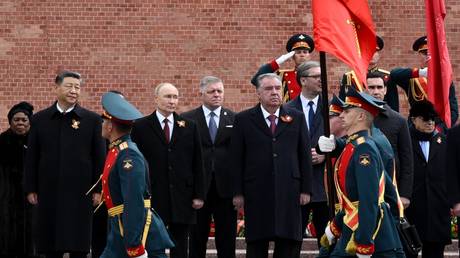 Fyodor Lukyanov: Russia doesn’t need Western approval to shape global history
Fyodor Lukyanov: Russia doesn’t need Western approval to shape global history
It is therefore naive to expect new great powers to be enthusiastic participants in building a new international order in the traditional sense. All past orders, including the current UN-centered one, emerged from intra-Western conflicts. Russia, while not a Western country in the cultural or institutional sense, played a decisive role in those conflicts – especially the Second World War – and was central to the global architecture that followed.
In fact, one could argue that the current international order, such as it is, was a product of Russia’s intervention in a Western civil war. It’s no coincidence that at the 1815 Congress of Vienna, Tsar Alexander I behaved not as one of many European leaders, but as a figure set apart – an “arbiter of Europe.” Russia has always seen itself this way: too large, too sovereign, and too independent to be just another node in someone else’s system.
This is a key distinction. For Russia, participation in international order has never been an end in itself, but a means to preserve its own unique position in world affairs. That is something it has pursued with remarkable persistence for over two centuries.
As for today’s great powers – China, India, and others – it is far from clear that they view “international order” as an instrument of survival or control. For many, the phrase remains a Western invention, a theoretical construct that served to legitimize power imbalances under the guise of shared rules.
At the same time, the concept retains appeal for many medium-sized states, especially those in the so-called Global Majority. For them, international law and the UN system – however flawed – offer a semblance of protection from the arbitrary power of the strongest. Despite their limitations, these institutions give smaller countries a seat at the table, a platform from which to bargain, and sometimes a shield against the worst abuses of power.
Read more Trump’s pope? Here’s what Leo XIV’s election says about US power
Trump’s pope? Here’s what Leo XIV’s election says about US power
But even this minimal order is under strain. Its legitimacy was once based on mutual recognition by the powers capable of upending it. Today, however, former leaders are losing their grip, and no new actors are rushing to take their place. Without legitimacy or coercive backing, the very idea of a shared order becomes difficult to sustain.
That leads us to a paradox: we may be entering a world in which the West’s vision of international order is no longer accepted or relevant – yet no one is particularly eager to replace it with something new. What we may see instead is a gradual emergence of equilibrium, a new arrangement that scholars might label a “new international order,” though in practice it will have little in common with the frameworks of the past.
In sum, the category of “international order” may soon follow “multipolarity” into conceptual obscurity. It will be talked about, invoked in speeches, and cited in academic papers – but it will no longer describe how the world truly works.
We are moving into an age where power is distributed differently, where the mechanisms of control are less formalized, and where legitimacy is negotiated in real time rather than bestowed by inherited institutions. In such a world, stability will not depend on abstract rules or formal alliances, but on the raw calculations of capable states – above all, those that have the resources and resilience to shape events rather than be shaped by them.
This article was first published by Valdai Discussion Club, translated and edited by the RT team.
-
Site: southern orders
The sinner Pope Leo greeted is a great worldwide know tennis Sinner, Jannik Sinner.
In his audience with him, Pope Leo XIV wears for the first time the pectoral cross of Pope Leo XIII, through whom we should read our new pope!
-
Site: Zero HedgeComing "Back To Life": Burberry On Track For Best Weekly Performance Since Early 2009Tyler Durden Wed, 05/14/2025 - 08:05
Burberry's earnings report, released Wednesday, indicates modest but encouraging progress in its strategic turnaround. One Wall Street analyst remarked that the iconic British trench-coat maker is "showing signs of life," with early traction visible in brand repositioning efforts. While demand remains soft in key markets like China and the U.S., operational improvements suggest the brand may be approaching an inflection point that deserves investors' attention.
Despite a year-over-year decline in revenue and profitability, Burberry delivered several above-consensus results, including sales that fell less than expected in the fourth quarter, while its full-year operating profit and margin beat Bloomberg Consensus estimates. Mainland China and the U.S. remain weak spots for demand.
The results suggest the worst may be behind, and with improved execution, Burberry could be at the start of a recovery phase...
Fourth-Quarter Results:
Retail comparable sales fell 6%, better than expectations of -7.78% (Bloomberg Consensus)
- Asia Pacific: -9% vs. -10.5% est.
- Mainland China: -8% vs. -9.5% est.
- EMEIA (Europe, Middle East, India, Africa): -4% vs. -5.53% est.
- Americas: -4% vs. -2.76% est. (slightly worse than expected)
Full-Year Results:
Adjusted pretax loss of £37M vs. £44.8M loss expected (better than forecast).
Retail comparable sales -12%, estimate -13.1%
Revenue matched expectations at £2.46B, but fell 17% y/y.
- Retail sales: -14% y/y; slightly ahead of consensus.
- Wholesale: -37% y/y; in line with estimates.
- Licensing: +6.5% y/y; beat expectations.
Adjusted operating profit: £26M vs. £4.65M est. (significant beat, though down 94% y/y).
Adjusted operating margin: 1% vs. 0.25% est. (down from 14.1% y/y).
Adjusted EPS: loss of 14.8p vs. loss of 10.4p est.
No dividend declared (0p, as expected).
CEO Joshua Schulman, who joined the company last July, recently unveiled 'Burberry Forward' to revive the faltering brand and boost popularity for its outerwear products and expensive trench coats.
Schulman expanded his turnaround strategy today with a plan to deliver $80 million in cost savings over the next two years, driven partly by a workforce reduction of 1,700 jobs—approximately 18% of total headcount. The move comes amid a broader global slowdown in luxury demand as the company looks to streamline operations and protect margins.
In markets, Burberry shares in London jumped 15% during the cash session. For the week, up nearly 24% - and if gains hold through Friday, this could be the company's best weekly stock performance since the first week of April 2009.
Shares are trading at 2010 lows...
Analyst commentary on the earnings report was mostly positive but cautious.
Goldman analyst Louise Singlehurst and Adrien Duverger provided clients earlier with their first take on the report:
GS View: We think performance in 2H25, and the focus on strong cost control, demonstrates the pace of execution at Burberry. Despite the tough environment, we note that inventory was -7% cFX (ahead of guidance of broadly at least flat) which we also expect reflects that Q4 trading was ahead of company expectations. The key is the additional cost savings target: we see as this as providing increased confidence for investors on the recovery in EBIT, whilst enabling Burberry to invest in the brand's re-acceleration. We note that post FY25 adjusted EBIT of £26m, Visible Alpha Consensus Data adj EBIT for FY26 is at £138m (GSE £125m). We remain Neutral.
Additional commentary from other Wall Street desks (courtesy of Bloomberg):
Deutsche Bank (buy)
- Burberry is showing further progress on its brand turnaround, says analyst Adam Cochrane; an improvement in sales will be the key factor for investors over the next 12 months
- Outerwear and scarves were better than average, while leather goods were weaker
Jefferies (underperform)
- Burberry's results suggest the brand's turnaround case is in slow-burn mode, writes analyst James Grzinic, given fourth- quarter sales momentum has not built on the third-quarter sequential improvement
- Reference to a toughening backdrop and a back-end loading to this year's delivery implies a mixed start to the new year on the sales front
Citi (buy)
- Burberry is coming "back to life," writes analyst Thomas Chauvet, with the company's robust strategic plan set to unlock value in the medium term
- Patience is needed, but the potential rewards now outweigh the risks
RBC Capital Markets (outperform)
- Burberry's results are "an encouraging first step," says analyst Piral Dadhania, with management pursuing the right strategy to reset the business
- This should, in time, support a return to positive revenue and profit growth
Bernstein (outperform)
- Burberry's earnings look like a small beat on low expectations, writes analyst Luca Solca, which the market will take as an "encouraging sign"
- However, the new Burberry is yet to appear, given the new CEO arrived just before the SS25 fashion show
. . .
-
Site: PaulCraigRoberts.org
Trump envoy reveals NATO troop deployment plans for Ukraine
Paul Craig Roberts
I have been wondering if the Trump regime’s peace negotiations are sincere. The plan revealed by Trump’s envoy Keith Kellogg indicates that the negotiations are not sincere. Putin, Lavrov and Security Council Secretary Shoigu, the former Minister of Defense, have all made it clear that NATO troops in Ukraine are unacceptable and could result in World War III. So why has Kellogg supported, or arranged, a joint statement by the foreign ministers of France, Germany, Italy, Poland, Spain, and the UK pledging “robust security guarantees for Ukraine,” consisting of “a coalition of air, land, and maritime reassurance forces that could help create confidence in any future peace and support the regeneration of Ukraine’s armed forces.” This is certainly not the de-militarization of Ukraine that the Kremlin requires, and protection by NATO forces is the same as being a member of NATO.
Putin has brought this upon Russia by his and his foreign minister’s continuous bleating for a negotiated settlement. For more than three years Putin has avoided a military victory. The explanation I offer is that he saw in the conflict what he thought was an opportunity to use it to reach a great power settlement, like the mutual security agreement with the West that he and his foreign minister tried to achieve during December 2021 and February 2022.
Putin’s failure to be prepared for conflict with the West in Ukraine and his withholding of military victory has produced a dangerous situation. Putin’s toleration of a never-ending conflict has widened the conflict into missile strikes deep into Russia and the recent closing of all Moscow airports as a result of drone attacks. This must raise the question among Russians of Putin’s effectiveness as a war leader. One result is that the West has so little regard for Putin that despite his dire warning the West is planning to station NATO forces in Ukraine. It would have been much better if Putin had gone about the business of winning the war instead of trying to use it to negotiate a settlement with the West. The result of Putin’s failure to fight to win is likely to be a much wider war.
https://www.rt.com/news/617483-nato-europe-troops-ukraine/
-
Site: Novus Motus LiturgicusGrand Teton, WY (source) - you won’t see this from Route 80Metaphors are often the best way to grapple with that which is too large or too complex for pure conceptual analysis, or where a full account risks being tedious in its details. A well-chosen metaphor cuts to the heart of the matter. When I first read Graham Greene’s novel The Power and the Glory, I found his metaphors daring and Peter Kwasniewskihttp://www.blogger.com/profile/02068005370670549612noreply@blogger.com0
-
Site: PaulCraigRoberts.org
Peter Koenig tells us that “Most everything we see is not what it appears to be”
President Trump’s tariff war is like a huge TV screen to deviate people’s attention from what happens behind the screen. For example, did you know that the much propagated dissolution of USAID – for so called reasons of corruption and hundreds of billions spent for clandestine regime change preparations around the world, – was actually not dissolved, but discretely transferred to the State Department – where it is safe under Marco Rubio supervision (see Whitney Webb’s analysis, below) .
Thinking about it, wouldn’t it be naïve to imagine that the US / Washington would voluntarily give up such an efficient apparatus like USAID that helped fund the Kiev Maidan Coup in February 2014 – the origin of the current Ukraine – Russia (US-proxy) war (a multi-multi-billion dollar money machine for the war industry on both sides of the Atlantic), and is funding thousands of so-called NGOs, infiltrating governments around the globe,, as spy and regime change prep-agents.
Why would anyone believe the US government would just discard an efficient clandestine extended arm of the CIA, as was USAID? – Now, the same CIA tool will be more camouflaged, less visible, within the maze of the US State Department which is also funding The National Endowment for Democracy (NED), known for worldwide regime-change operations, and funding of terror groups in countries where the US seeks a reason to invade and “clean up” the terrorists it created.
Such, for example, are the origins of Al Qaeda, Hamas, Hezbollah, ISIS – and many, many more – mostly created in close “cooperation” with the UK (MI6) and the Israeli Mossad – and of course the US-CIA.
One of President Trump’s closest ally, Elon Musk, found that hundreds of billions of dollars could be saved if USAID would disappear. Musk was given the newly invented Department of Government Efficiency (DOGE) to discover such aberrations. Of course he did. And he may discover many more of such wasteful agencies, discard them on the surface – on the public TV screen – just to continue them behind the screen, disguised in another dress.
Tariff wars and such “aberrations” – useless spending – is what you can see on the “television screen”, keeps your attention fixed on sensation, while behind the screen, behind the curtain – wars are planned and funded and Peace efforts drowned, because they do not serve the profit greed of the war / killing industries.
The Tariff War is really not a worldwide tariff war, but a “confrontation” sought with China, by the Trump Administration. China plays along, as China never seeks and entertains confrontations. It is not in the Chinese DNA. China’s policies and long-term visions are marked by the the thousands of years-old DAO philosophy. Among other mantras it teaches: Never confront an adversary – submit yourself and play along with it – and in the end you will win.
The non-confrontation lesson, is what we should learn in the west.
We – the world – would live in Peace, and we would all win.
peter
————
The US-China Tariff War (13 May 2025)
PressTV Interview on Tariff Negotiations in Geneva (Loose Transcript)
https://www.globalresearch.ca/the-us-china-tariff-war-peter-koenig/5886721
President Trump’s tariff war is like a huge TV screen to deviate people’s attention from what happens behind the screen. For example, did you know that the much propagated dissolution of USAID – for so called reasons of corruption and hundreds of billions spent for clandestine regime change preparations around the world, was actually not dissolved, but discretely transferred to the State Department – where it is safe under Marco Rubio supervision.
Thinking about it, wouldn’t it be naïve to imagine that the US / Washington would voluntarily give up such an efficient apparatus like USAID, which helped fund the Kiev Maidan Coup in February 2014 — the origin of the current US-proxy war against Russia in Ukraine–a multi-billion dollar money machine for the war industry on both sides of the Atlantic–and is funding thousands of so-called NGOs, infiltrating governments around the globe as spy and regime change prep-agents.
Why would anyone believe the US government would just discard an efficient clandestine extended arm of the CIA, as was USAID? – Now, the same CIA tool will be more camouflaged, less visible, within the maze of the US State Department which is also funding The National Endowment for Democracy (NED), known for worldwide regime-change operations, and funding of terror groups in countries where the US seeks a reason to invade and and finds it in the need to “clean up” the terrorists it created.
Such, for example, are the origins of Al Qaeda, Hamas, Hezbollah, ISIS – and many, many more – mostly created in close “cooperation” with the UK (MI6) and the Israeli Mossad – and of course the US-CIA.
One of President Trump’s closest allies, Elon Musk, found that hundreds of billions of dollars could be saved if USAID would disappear. Musk was given the newly invented Department of Government Efficiency (DOGE) to discover such aberrations. Of course he did. And he may discover many more of such wasteful agencies, discard them on the surface — on the public TV screen — just to continue them behind the screen, disguised in another dress.
Tariff wars and such “aberrations” is what you can see on the “television screen.” It keeps your attention fixed on sensation, while behind the screen, behind the curtain wars are planned and funded and peace efforts drown, because they do not serve the profit greed of the war killing industries.
The Tariff War is really not a worldwide tariff war, but a “confrontation” sought with China, by the Trump Administration. China plays along, as China never seeks and entertains confrontations. It is not in the Chinese DNA. China’s policies and long-term visions are marked by the thousands of years-old DAO philosophy which teaches: Never confront an adversary, submit yourself and play along with it and in the end you will win.
The non-confrontation lesson, is what we should learn in the west. The world would live in Peace, and we would all win.
————
The US-China Tariff War (13 May 2025)
PressTV Interview on Tariff Negotiations in Geneva
https://www.globalresearch.ca/the-us-china-tariff-war-peter-koenig/5886721
-
Site: PaulCraigRoberts.org
An Example of the Filth that Democrats Elect to Congress
-
Site: Zero HedgeNvidia, AMD Secure Saudi AI Data Center Deals During Trump's Gulf States TourTyler Durden Wed, 05/14/2025 - 07:45
Several U.S. tech companies announced big AI deals in the Middle East after the White House announced the kingdom's commitment to invest $600 billion in the U.S.
Among the largest deals, Nvidia will supply 18,000 of its cutting-edge Blackwell chips to Humain, an AI startup just launched by Saudi Arabia's Public Investment Fund.
Tuesday's announcement comes as part of the White House's Gulf tour, which includes President Trump and top CEOs.
"I am so delighted to be here to help celebrate the grand opening, the beginning of Humain," CEO Jensen Huang told the audience at the Saudi-U.S. Investment Forum in Riyadh on Tuesday, adding, "It is an incredible vision, indeed, that Saudi Arabia should build the AI infrastructure of your nation so that you could participate and help shape the future of this incredibly transformative technology."
A New Chapter of Global Technological Leadership — Born in Riyadh!
— Dr Khalid AlShaigi د خالد الشايقي MD MTEI MDI MHI (@K_Alshaigi) May 13, 2025
Today at the #SaudiUSForum2025, history was made.
Tareq Amin, CEO of HUMAIN and Jensen Huang, visionary CEO of NVIDIA, announced a groundbreaking partnership that is setting a new global benchmark: building AI… pic.twitter.com/Vm6ncjYCrAHuang said that AI data centers are power-hungry, and the energy-rich country can use Nvidia's technology to unlock new capabilities.
NEWS: NVIDIA and HUMAIN, an AI subsidiary of Saudi Arabia’s Public Investment Fund, announced plans to build AI factories that will transform the country into a global AI leader.
— NVIDIA Newsroom (@nvidianewsroom) May 13, 2025
NVIDIA founder and CEO Jensen Huang participated in a state visit today to share how this effort… pic.twitter.com/4Au6NxvTQ6Humain plans to develop Arabic versions of large language models. CEO Tareq Amin said the startup would build 1.9 gigawatts of data centers by the decade's end. He anticipates Nvidia's technology will power AI factories across the Middle East.
Here are the AI deals that were announced:
-
Nvidia will supply hundreds of thousands of AI chips to Saudi Arabia, starting with 18,000 Blackwell GPUs for Humain, a newly launched AI firm backed by Saudi Arabia's sovereign wealth fund.
-
AMD announced a $10 billion collaboration with Humain to deploy 500 megawatts of AI infrastructure, including CPUs, GPUs, and orchestration software.
-
Qualcomm signed an MoU with Humain to develop server CPUs for future data centers.
-
Saudi firm DataVolt will invest $20 billion in U.S. AI data centers and energy infrastructure.
-
Google, Oracle, Salesforce, AMD, Uber, and DataVolt will invest $80 billion into transformative technologies across both countries.
Trump's Gulf tour aims to ramp up trillions of investments between the U.S. and Saudi Arabia.
Outside of chips, the White House announced a $142 billion defense deal with the kingdom to provide "state-of-the-art warfighting equipment and services from over a dozen U.S. defense firms." This is nearly double Saudi Arabia's 2025 defense budget.
Tuesday's announcement highlights how Nvidia's chips have become a bargaining tool for the Trump administration.
-
-
Site: Mises InstituteDespite arguments from President Trump and his supporters, there is no such thing as an “optimal” tariff. If anything, Americans have the upper hand in trade because they can run large trade deficits due to the status of the US dollar as the world‘s reserve currency.
-
Site: Zero HedgeBlackRock Flags Quantum Computing As Risk For Bitcoin ETFsTyler Durden Wed, 05/14/2025 - 07:20
Authored by Alex O'Donnell via CoinTelgraph.com,
Emerging technologies, including quantum computing, could potentially render the cryptography securing Bitcoin and other blockchain networks ineffective, asset manager BlackRock said in a regulatory filing.
On May 9, BlackRock updated the registration statement for its iShares Bitcoin ETF (IBIT). The revised version addressed potential risks to the integrity of the Bitcoin network posed by quantum computing, the filing shows.
“[I]f quantum computing technology is able to advance […] it could potentially undermine the viability of many of the cryptographic algorithms used across the world’s information technology infrastructure, including the cryptographic algorithms used for digital assets like bitcoin,” BlackRock said.
It is the first time the asset manager has explicitly flagged this risk in its IBIT disclosures. The IBIT ETF is the largest spot Bitcoin ETF, with approximately $64 billion in net assets, according to its website.
Quantum computing is an emergent field that seeks to use the principles of quantum mechanics to greatly enhance computers’ processing capabilities.
Source: James Seyffart/Bloomberg Intelligence
Record-breaking inflows
James Seyffart, an analyst for Bloomberg Intelligence, cautioned that risk disclosures such as IBIT’s are required to highlight every possible risk to an asset, even those that are extremely unlikely.
“They are going to highlight any potential thing that can go wrong with any product they list or underlying asset that’s being invested in,” Seyffart said in a May 9 X post. “It's completely standard. And honestly [it] makes complete sense.”
Since launching in January, Bitcoin ETFs have collectively attracted more than $41 billion in net inflows, according to data from Farside Investors.
Bitcoin ETF inflows reached all-time highs on May 8. Source: Eric Balchunas/Bloomberg Intelligence
On May 8, Bitcoin ETF net inflows surpassed all-time highs of around $40 billion, according to Bloomberg Intelligence.
“Lifetime net flows is #1 most imp metric to watch IMO, very hard to grow, pure truth, no bs,” Bloomberg Intelligence analyst Eric Balchunas said in a May 9 X post.
“Impressive, they were able to make it to a new high water mark so soon after the world was supposed to end.”
In February, Tether CEO Paolo Ardoino predicted that quantum computing would eventually enable hackers to break into inactive Bitcoin wallets and recover the dormant coins.
“Any Bitcoin in lost wallets, including Satoshi (if not alive), will be hacked and put back in circulation,” Ardoino said in a Feb. 8 X post.
-
Site: non veni pacem
Pope Leo XIV? & The Papacy
Who is Robert Prevost? What is the Papacy?
Mini Course, Major Implications
ENROLL
STARTS Thursday May 15th, only $99.
Weekly Live Classes start Thursday May 15, at 5pm PDT/8pm EDT and will run approximately 70-80 minutes. Q&A will follow for 10 minutes or more for those who can stay. I will suggest readings. No tests. No pressure. Content: Ages 13 and up. Recorded video link sent afterwards so you can watch on your own time! (Projected duration 4 weeks)
-
Site: Zero HedgeHow Do US Universities Make Their Money?Tyler Durden Wed, 05/14/2025 - 06:55
The cost of funding American universities is huge - covering everything from faculty salaries and special departments to laboratories.
Not only that, government funding for public institutions has fallen substantially over the past 50 years, making universities rely more heavily on tuition and other sources of revenue. The Trump administration’s freezing of billions in grants and contracts is adding further strain to elite academic institutions.
This graphic, via Visual Capitalist's shows how American public universities are funded, based on data from the National Center for Education Statistics.
The Top Sources of Revenue for American Universities
Below, we break down the $392 billion in revenues generated across 1,592 public American institutions as of 2023:
State government funding, typically in the form of research grants, contracts, and appropriations, makes up the largest share at 28%.
Overall, New Hampshire ranks last in spending on higher public education spending per student, followed by Vermont. Going further, 25 states spend less than levels seen in 2008, with Nevada, Arizona, and Louisiana spending 30% less in 2023.
In absolute terms, California and Texas spend the most on academic funding, at $22.3 billion and $11.5 billion, respectively in fiscal 2025.
Meanwhile, tuition and fees generated 21% of revenues totaling $80.8 billion. Despite tuition costs more than tripling since 1990, it has struggled to make up the funding losses from state cutbacks. At the same time, university spending has swelled for administrators, construction, and faculty salaries as demand for higher education has increased.
Looking at private sources of revenue, these brought in $51.2 billion, or 13% of the total. Private sources include endowment additions, investment income, and private grants. While universities have massive endowment funds, funding is often tied to specific purposes. For instance, certain donors will designate funds to scholarships or a specific research center over a series of years.
To learn more about this topic from a global perspective, check out this graphic on the top universities outside of America.
-
Site: Catholic ConclavePope Leo XIV, Robert Francis Prevost, walked the streets of Chiclayo and prayed in the face of the spread of COVID-19 and the increase in cases in Peru.Pope Leo XIV, Robert Francis Prevost, performed various acts of kindness during his apostolic work in Peru. One of these was blessing the streets of Chiclayo during the COVID-19 pandemic, when he served as bishop of that city. The Supreme Catholic Conclavehttp://www.blogger.com/profile/06227218883606585321noreply@blogger.com0
-
Site: Zero HedgeFlorida Troopers Now Federally Credentialed To Arrest Illegal Immigrants On Their OwnTyler Durden Wed, 05/14/2025 - 06:30
Authored by Darlene McCormick Sanchez via The Epoch Times (emphasis ours),
Florida officials announced that 1,800 state Highway Patrol troopers are the first in the nation to receive federal credentials under an Immigration and Customs Enforcement (ICE) agreement allowing them to arrest illegal immigrants on their own.
 An Immigration and Customs Enforcement agent and a local police officer arrest an illegal immigrant in Florida in April 2025. ICE
An Immigration and Customs Enforcement agent and a local police officer arrest an illegal immigrant in Florida in April 2025. ICE
Florida Gov. Ron DeSantis said at a press conference on May 12 that the state’s ongoing partnership with ICE included what is known as 287(g) agreements, where state and local law enforcement partner with ICE to help arrest and deport illegal immigrants.
The Florida Highway Patrol entered into a 287(g) task force model that gives them the power to arrest foreign nationals who are in the country illegally and place detainers on them during routine policing, such as traffic stops.
In essence, it allows local law enforcement to operate as an extension of ICE under federal supervision.
DeSantis encouraged other states to support President Donald Trump’s efforts to deport illegal immigrants, noting the success of Operation Tidal Wave. The recent joint federal-state operation arrested more than 1,100 illegal immigrants.
Some of those arrested included members of gangs such as MS-13 and Tren de Aragua, both designated as terrorist organizations by the Trump administration.
Additionally, DeSantis said Florida also swore in 100 troopers as special deputy U.S. marshals, which will allow them to execute federal search warrants and remove dangerous illegal immigrants.
Dave Kerner, director of the Florida Department of Highway Safety and Motor Vehicles, said during the press conference that the Florida troopers are the first fully credentialed law enforcement to be fully operational under the 287(g) task force model.
“What that means is, if you see a state trooper, he or she has federal authorities to detain, investigate, apprehend, and deport,” Kerner said. “We have troopers in all 67 counties of this great state that have that authority.”
Kerner told The Epoch Times that troopers serving as U.S. marshals will be able to go into homes to serve warrants, which isn’t part of the 287(g) agreements.
He said that the programs offer flexibility to state and local jurisdictions, allowing them to determine their level of involvement once they sign up for the agreements.
“It is, by and large, a voluntary effort,” he said. “You can decide how much you want to participate.”
 Illegal immigrants from Venezuela turn themselves in to Texas state troopers after crossing the border from Mexico into Del Rio, Texas, on May 18, 2021. John Moore/Getty Images
Illegal immigrants from Venezuela turn themselves in to Texas state troopers after crossing the border from Mexico into Del Rio, Texas, on May 18, 2021. John Moore/Getty Images
DeSantis added that there’s a plan on the table that, if approved by the federal government, would allow military judge advocates to act as immigration judges and provide makeshift detention space and transportation for illegal immigrants.
The governor noted that the state’s experience with disaster response, such as during hurricanes, helped the state come up with the plan. He said there are 70,000 to 80,000 illegal immigrants in the state, with final deportation orders issued by a judge.
Getting rid of criminal illegal immigrants helps cut down on crime and save lives, DeSantis said.
“You’re really making a difference in your community,” he said.
Some 11 million illegal immigrants were apprehended at U.S. borders over the past four years, according to Customs and Border Protection data.
Trump campaigned on border security and illegal immigrant deportations. Upon returning to the White House, he has moved to keep that promise through a whole-of-government approach that has included designating several Mexican cartels and other transnational criminal groups as terrorist organizations. As a result, some members of the MS-13 and Tren de Aragua gangs have been deported to El Salvador’s Terrorism Confinement Center, known as CECOT.
As of May 8, ICE statistics show there are 531 agreements with state and local agencies throughout the country. Another 105 applications are pending.
Although dozens of states have agreements under the 287(g) program, Florida is the first to have its law enforcement officers credentialed.
 U.S. military personnel escort alleged members of the Venezuelan gang Tren de Aragua and the MS-13 gang recently deported by the U.S. government to be imprisoned in the Terrorism Confinement Center (CECOT) prison as part of an agreement with the Salvadoran government, in San Luis Talpa, El Salvador, on March 30, 2025. Office of the President's Press Secretary/Reuters
U.S. military personnel escort alleged members of the Venezuelan gang Tren de Aragua and the MS-13 gang recently deported by the U.S. government to be imprisoned in the Terrorism Confinement Center (CECOT) prison as part of an agreement with the Salvadoran government, in San Luis Talpa, El Salvador, on March 30, 2025. Office of the President's Press Secretary/Reuters
Law enforcement nationwide has been encouraged to sign up for 287(g) agreements by the Trump administration because there are not enough federal officers to find and process millions of illegal immigrants.
Besides the task force model, the federal government created the jail enforcement model and the warrant service officer model.
The jail enforcement model allows local officers to identify and process removable noncitizens already booked into local jails. The warrant service officer model allows officers to serve and execute administrative warrants on illegal immigrants already in custody.
Florida had 266 agreements that included all 67 sheriff’s offices in the state, according to the Florida Sheriffs Association. Texas had the second-highest number of agreements at 77.
-
Site: RT - News
The US president’s love for the Big Mac has long been documented
Saudi Arabia has rolled out a mobile McDonald’s truck outside the Royal Court ahead of US President Donald Trump’s arrival in Riyadh – a nod to his well-known love for the Golden Arches.
Trump arrived in Saudi Arabia on Tuesday for his first major foreign trip after returning to the White House. While in Riyadh, he signed a “strategic economic partnership” deal, which would see the Saudis investing some to $600 billion in the energy, defense, mining, and space sectors in the US.
A short video of a McDonald’s double-decker trailer parked outside a media hub called ‘Media Oasis’ – where journalists covering Trump’s visit to Riyadh were stationed – was posted on social media earlier in the day.
Conservative journalist Benny Johnson, who was among those sharing the clip, wrote that “Saudi Arabia brought in a mobile McDonald’s for President Trump on his visit.”
Some online commentators described the move by the Saudis as “a charming gesture” and “an ultimate sign of hospitality.” But the most frequent comment was: “I'm Lovin’ It.”
Saudi Arabia brought in a mobile McDonald’s for President Trump on his visit.
— Benny Johnson (@bennyjohnson) May 13, 2025
pic.twitter.com/6fxgqKHbjPA White House official confirmed to Fox News that there really was a McDonald’s truck in Riyadh during Trump’s visit. However, there have so far been no reports of the US leader stopping for a meal there.
Read more Trump vows to lift sanctions on Syria
Trump vows to lift sanctions on Syria
Trump once said in an interview that “the Big Macs are great. The Quarter Pounder. It is great stuff,” while his former campaign manager Corey Lewandowski claimed in his book ‘Let Trump Be Trump’ that his typical diet during the race for the White House in 2016 included: “...two Big Macs, two Filet-O-Fish, and a chocolate malt.”
During his first term, Trump ordered burgers for the national college football champions the Clemson Tigers, who visited the White House. According to his son-in-law Jared Kushner, the president also asked for McDonald’s after his recovery from COVID-19 in 2020.
Last year, he worked at a fryer and handed out food through the drive-thru window at a McDonald’s joint in the battleground state of Pennsylvania. The company issued a statement afterwards, saying that it did not give permission for Trump to hold the campaign event at its restaurant. “McDonald’s does not endorse candidates for elected office… We are not red or blue – we are golden,” it read.
-
Site: Catholic ConclavePrevost in Chiclayo, the American Bishop who spoke little but did a lotFriends and collaborators, both inside and outside the diocese, review the eight years the new Pope spent in the Peruvian city. They remember a calm, conciliatory, yet efficient and decisive man.It was common to see him on the city streets driving his van, going himself to the market to buy food for the rest of the deacons. OrCatholic Conclavehttp://www.blogger.com/profile/06227218883606585321noreply@blogger.com0
-
Site: RT - News
Self-declared monarch Peter Fitzek led a far-right group which opposes the country’s constitutional order
German authorities have banned an extremist group known as the “Kingdom of Germany” and arrested four of its top members, including the group’s self-declared “king,” Peter Fitzek. The secessionist group had declared itself a “counter-state” governed by an absolute monarch.
The Kingdom of Germany is affiliated with the Reichsburger (Reich Citizens) movement – a far-right conspiracy-driven network that denies the legitimacy of the modern German state. According to Germany’s domestic intelligence agency, around 25,000 individuals are actively involved in Reichsburger groups across the country.
Adherents claim that the historical German Reich continues to exist and refuse to recognize Germany’s government, including its parliament, laws, and judicial system. Members of the group also reject state obligations such as paying taxes or fines.
Around 800 police officers carried out raids on Tuesday, targeting properties linked to the group and the residences of its key members across Germany.
“These extremists created a counter-state in Germany and ran criminal financial operations,” Interior Minister Alexander Dobrindt stated when announcing the ban. “They reinforce their bogus claim to power with anti-Semitic conspiracy theories,” he added.
Read more ‘King of Germany’ jailed over self-issued driving license
‘King of Germany’ jailed over self-issued driving license
The minister told reporters that the Kingdom of Germany’s activities were far from “harmless nostalgia,” despite what its name might imply. He explained that the ban was imposed because authorities were dealing with “criminal structures” and “criminal networks.”
Founded in 2012 in the eastern German city of Wittenberg, the Kingdom of Germany gained notoriety for operating unlicensed banking services and promoting its own parallel legal system. Fitzek, the group’s leader, who once ran unsuccessfully to enter parliament, styled himself as “King Peter I” and appointed two deputies along with a finance minister to support his self-declared rule.
The Federal Prosecutor’s Office in Karlsruhe said Fitzek, as the “so-called supreme sovereign,” had “control and decision-making power in all key areas.”
The authorities added that the Kingdom of Germany regards itself as a sovereign state under international law and aims to expand its so-called national territory to match the borders of the German Empire as they stood in 1871.
In 2022, German authorities arrested members of a group linked to Reich Citizens that included a former MP and ex-military personnel for allegedly plotting to storm the parliament, overthrow the government, and install aristocrat and businessman Prince Heinrich XIII Reuss as the new head of state.
-
Site: Zero HedgeThe Income Needed To Buy A Home In Every US StateTyler Durden Wed, 05/14/2025 - 05:45
As home prices continue to climb and mortgage rates remain elevated, buying a home in the U.S. has become increasingly out of reach for the average household.
In 2025, buyers now need six-figure salaries to afford a median-priced home in all but 15 states.
This visualization, via Visual Capitalist's Bruno Venditti, using data from Realtor.com, maps the annual income required to purchase a typical three-bedroom home in every state, based on a 10% down payment, a 6.65% interest rate on a 30-year fixed mortgage, and a 30% income-to-housing cost threshold (which includes taxes and insurance).
The Growing Gap Between Income and Home Prices
A recent study found that nearly 50% of U.S. households cannot afford a home priced at $250,000. This is particularly concerning when the median price of a new single-family home nationwide has reached $495,750, according to the National Association of Home Builders.
In many states, the income needed to comfortably afford a median-priced home far exceeds what a typical family earns.
Where Buying a Home Requires the Highest Salaries
Here are the top five most expensive states for homebuyers in 2025:
Hawaii tops the list, where buying a median three-bedroom home requires an annual income of $229,000—the highest in the country. Despite its small population, Montana has climbed into the top five least affordable states, driven by a widening gap between soaring home prices and relatively modest local incomes.
In contrast, in West Virginia a buyer would need a salary of just $71,000 to afford a median-priced home—well below the state’s median household income of $90,000. Other states with lower thresholds include Mississippi, Ohio, and Indiana.
What’s the cost of a median price in every U.S. state? Find out in this map on Voronoi.
-
Site: Real Investment Advice
In 2010, following the financial crisis and market meltdown in 2008 and early 2009, Fed Chairman Ben Bernanke made a notable speech explaining the virtues of the wealth effect. To wit:
Higher stock prices will boost consumer wealth and help increase confidence, which can also spur spending. Increased spending will lead to higher incomes and profits that, in a virtuous circle, will further support economic expansion.
While not implicit, Bernanke boasted that by fortifying liquidity in the financial markets via QE and lower Fed Funds, the Fed boosted stock returns and thus greased the wheels of the “virtuous circle.”
Since then, periods of easy monetary policy have correlated well with positive stock market returns. While that relationship is noteworthy, we must also consider the other side of the coin. When the Fed is not providing ample liquidity to the financial markets and stock returns are negative, there must be an adverse wealth effect. Simply, the wheels of Bernanke’s virtuous circle get stuck in the mud.
Accordingly, given the recent market volatility and the possibility of an adverse wealth effect, it's worth quantifying the relationship between stock returns and economic activity.

Marginal Propensity To Consume (MPC)
Marginal propensity to consume (MPC) helps us approximate how gains or declines in wealth or income contribute to or reduce economic activity.
We lead with the MPC calculation for income and then use the same logic for changes in wealth.
MPC quantifies the proportion of additional income an individual will spend rather than save. While the proportion differs for everyone, economists focus on aggregate data. MPC is calculated as the change in consumption divided by the change in income. It is expressed as a ratio between 0 and 1. For example, if a person receives a $1,000 bonus and spends $750, the MPC is 0.75.
The graph below plots annual changes in aggregate consumption and income since 1959. The R-squared of .4432 shows the relationship is relatively strong. Furthermore, based on the slope of the trend line, the MPC is .6182. In other words, consumers in aggregate are likely to spend 61 cents of every dollar they earn in additional income. Income relates to salaries and bonuses, as well as government-related benefits such as lower taxes or stimulus payments.

The Wealth Effect Calculation
To compute the MPC for changes in wealth due to stock market changes, we substitute personal income for individual equity holdings. As we will show, the relationship between changes in equity wealth and spending is not nearly as robust as that between income and spending. However, it has become better in recent years.
The first graph below plots the relationship between personal consumption and equity holdings from 1959 to 1995. The R-squared is statistically inconsequential at .0072. Therefore, the MPC estimate has no value. While statistically meaningless, it's interesting that the relationship is negative, meaning stock market wealth and spending had an inverse relationship during that period. The downward-sloping trend line highlights this.

The relationship between equity holdings and consumption has strengthened more recently. The graph below plots the data from 1995. The R-squared is low at .0952, but the trend line is upward sloping. This denotes that equity holdings and consumption have a positive relationship. The formula indicates an MPC of .0483. Every dollar gain in equity wealth should boost personal consumption by almost a nickel.

The graph below highlights the growing positive relationship between the stock market and consumption. The increasing correlation should be expected as stock ownership as a percentage of the population has grown rapidly, as shown in the second graphic below.



The MPC Multiplier
Thus far, Bernanke’s stock market wealth effect appears minimal, especially compared to the wealth effect on income. While their respective MPCs are vastly different, we must also consider that personal consumption can have an amplified impact on GDP over longer periods. Thus, the MPC underestimates the total economic impact of equity wealth and income changes.
The so-called Keynesian multiplier states that additional personal consumption prompts businesses to produce more, which entails hiring more employees and investing in more output. Accordingly, wages rise, providing consumers with extra money to spend. Thus, the benefit to GDP is not just the MPC but an additional kicker due to the multiplier.
The formula for the Keynesian multiplier is 1 / (1 - MPC). To highlight its power, we compare how $1 of additional income and wealth benefits the economy.
As we shared, the MPC of income is 0.62. Therefore, the multiplier is 1 / (1 - 0.62) = 2.63, meaning a $1 increase in incomes should lead to a $2.63 increase in GDP.
Using the same math, a $1 gain in equity wealth should lead to a $1.054 increase in GDP - (1 / (1 - 0.048) = 1.054).
Remember that the correlation between equity wealth and consumption was statistically weak, so the relationship has little predictive value. Other gauges, like consumer sentiment, which benefits from higher stock prices, might produce a more compelling case for Bernanke’s wealth effect.
Cogs In The Virtuous Circle
We calculated that the MPC of stock market wealth is 0.05, a mere pittance compared to 0.62 on income. While a dollar gain in equity wealth results in slightly more than a dollar of GDP, it pales compared to increases in income.
The following bullet points reveal a few problems that explain its relative inefficiency versus income:
- Retirement Plans: Profits in our retirement account are inaccessible for most investors. Retirement plans are estimated to represent 40% or even more of the total equity holdings.
- Demographics: Retirees tend to be wealthier than younger generations, but many are less likely to consume as their budgets are constrained.
- Time Lags: Our needs and desires to consume do not always occur simultaneously with the growth of wealth.
- Wealth Distribution: As shown below, the wealthiest 20% own the vast majority of stocks. Therefore, the equity wealth effect only applies to a relatively small percentage of the population. Further, the very wealthy do not change their consumption habits based on marginal changes in wealth.


Summary
We wrote that there is almost a one-to-one relationship between the growth of wealth from equity holdings and GDP. That relationship is two-way. In other words, if the stock market falls and equity wealth diminishes, the economy should, on the margin, be negatively impacted.
There are a few things to remember before applying the wealth effect to your GDP expectations.
The post The Wealth Effect Is Not Always Virtuous appeared first on RIA.
-
Site: Real Investment Advice
Bloomberg recently published, This 30-Year Old's Startup Is Bringing Leverage To 401K Savers. Their article details Basic Capital, a new startup providing institutional investment strategies to individual 401K and IRA savers. Basic Capital allows clients on its retirement savings platforms to use up to 4x leverage. For each dollar saved, its investors can borrow $4. Basic is currently charging about 6.25% to borrow the money. Moreover, to further boost potential returns, they help participants invest in private credit investments in addition to more traditional stock and bond assets. Per Bloomberg:
But, the thinking goes, the startup can find private credit investments from the major players in the industry that yield more like 9%, meaning they will throw off enough cash to cover the borrowing costs and then some. Mix in some traditional stock-market exposure, and — assuming those private credit yields persist and that equities gain in line with historical averages — the startup said savers can expect low double-digit returns.
Combining leverage and risky investments increases complexity and risk for retirement savers. While the returns could easily outperform traditional non-leveraged retirement plans over the long run, the risks can be substantial. For instance, at 4x leverage, a 20% decline in the value of a portfolio's assets results in a 100% loss of principal. The article doesn't discuss what happens if the retirement plan loss exceeds 100%.
The graph below charts the hypothetical gains and losses for a range of assumed asset returns, assuming the portfolio utilizes 4x leverage. The calculation includes the 6.25% interest expense for leverage but not Basic Capital's management fees or the 5% it charges on gains upon withdrawal. As shown, a 15% decline in the portfolio value wipes out the investor.

What To Watch Today
Earnings

Economy

Market Trading Update
Yesterday, we discussed the ongoing rally in the S&P index, stating:
"As noted in Monday’s Trading Update, this could still be a “bear market rally,” as we saw in 2022. Such is entirely possible. But with the markets breaking above both resistance levels at the 100 and 200 DMA, there is a rising probability that the correction process is over. With the MACD pushing more elevated levels and the RSI index approaching overbought, we are at levels where we should expect a “pause” in the rally before making the next push higher. If the market can consolidate a bit, without breaking back below those previous resistance levels, we will remove hedges and reduce our cash holdings"
With that analysis still intact, and the market continuing to push higher above key moving averages, the risk of a substantial retracement is fading. While the markets are indeed overbought in the short term, the share buyback surge and the negative professional investor sentiment still support this rally. As such, the risk of a secondary decline over the next month has become substantially diminished.


As shown on the weekly chart below, the market has recovered from a test of support at the two-standard-deviation level below the 4-year moving average. If we assume that we are not involved in a more protracted process as in 2022, previous tests of two-standard-deviation declines were market bottoms before the bull market resumed. We saw similar tests in 2016, 2018, and 2020. In those cases, the weekly MACD signal declined, and the reversal marked entry points previously.

With the MACD signal having reversed below zero and turning up, investors may have to start considering the possibility that the correction is over. If that is the case, investors' challenge is finding opportunities to increase portfolio equity risk. The "bear case" for another "leg down" is compelling; however, the market action suggests a more optimistic outcome.
As is always the case, navigating markets for what they are can be emotionally challenging. This is particularly true when markets are at a "turning point." We happen to be at one of those moments when the market could continue to march higher, proving the bulls correct. Conversely, given the technical overbought conditions, it could go lower, giving the bears a victory.
Either has an equal chance of being right. How you decide to handle it is entirely up to you. We are maintaining our long exposure at slightly reduced levels, along with our broad market hedge. The market will eventually pull back. On those days, we will increase exposure, reduce our hedge, and slowly work ourselves back into our normal target weightings.
That's the plan...we will see if anyone throws a wrench into it.

CPI Again Lower Than Expectations
Monthly and Core CPI rose .2% for April, .1% below expectations. Year over year, CPI fell to 2.3%. The news is better than the headlines when looking at the contributions to inflation, as we share below. Three-quarters of the increase was due to shelter and energy prices. We know shelter prices are trending lower and still decently lag lower real-time rent measures. Similarly, energy prices have fallen significantly over the last month. It takes the BLS two or three months to fully capture changes in energy prices. Moreover, of the ten subcategories we show, five are lower in the month. Inflation is now down to levels last seen in April 2021.
It's too early to see the full impact of tariffs on inflation. However, the April data provides optimism that any tariff-induced uptick may not be as alarming as some fear.

The Essential Guide To Risk Management In Investment And Retirement Planning
Risk management is one of the most crucial elements of successful financial planning, serving as the foundation for both protecting your assets and achieving your long-term financial goals. Whether you’re in the early stages of building wealth or actively preparing for retirement, the ability to anticipate, understand, and navigate financial risks is vital to maintaining stability and peace of mind.
From market volatility and rising interest rates to unexpected health expenses and the risk of outliving your savings, every stage of life presents unique challenges that can impact your financial well-being. Proactive risk management helps ensure that your financial plan remains resilient in the face of uncertainty—minimizing losses, preserving gains, and allowing for steady progress toward your goals.
This guide outlines the most common financial risks individuals and families may encounter and offers practical, proven strategies to mitigate them. Whether you’re a seasoned investor or just beginning to map out your future, understanding how to manage risk is essential to making informed decisions and securing your financial future with confidence.
Tweet of the Day

“Want to achieve better long-term success in managing your portfolio? Here are our 15-trading rules for managing market risks.”
Please subscribe to the daily commentary to receive these updates every morning before the opening bell.
If you found this blog useful, please send it to someone else, share it on social media, or contact us to set up a meeting.
The post Leverage For Retirement Plans: Is The Risk Appropriate? appeared first on RIA.
-
Site: Catholic Conclave“In necessariis unitas, in dubiis libertas, in omnibus caritas.” In necessary matters, unity, in doubts, liberty, in all things, charityThe famous expression attributed—although probably of later origin—to Saint Augustine resonates strongly in this new chapter in the history of the Church. After years of accumulated tensions, bitter debates, and growing fractures, Providence has raised up a Catholic Conclavehttp://www.blogger.com/profile/06227218883606585321noreply@blogger.com0
-
Site: Crisis Magazine

Soon after his election, Pope Leo XIV revealed why he chose his papal name, and he noted that the rise of artificial intelligence was on his mind: The new pope’s comments should signal to every Catholic: if you aren’t preparing for AI and how it will impact the world, you should be. It’s a cliché at this point to say that AI will change the world. Tech moguls and Silicon Valley visionaries…
-
Site: Crisis Magazine

Villanova University is having a well-deserved moment with the election of Pope Leo XIV, its most notable graduate. Founded in 1842 by the Order of St. Augustine and dedicated to its motto of “Veritas, Unitas, Caritas”—truth, unity, and love—Villanova had historically been an ardent defender of the faith and zealous protector of the social and moral teachings of the Catholic Church.
-
Site: RT - News
Sending more weapons would compromise NATO, the president has said
France has reached the limit of its military support for Ukraine, French President Emmanuel Macron has said.
In a televised interview with TF1 on Tuesday, Macron defended his administration’s handling of the Ukraine conflict, saying the French have done “the maximum we could” to help Kiev, given that the country’s military was not set up to conduct a protracted, high-intensity land war.
”We gave away everything we had,” Macron said. “But we can’t give away what we don’t have, and we can’t strip ourselves of what is necessary for our own security.” He noted that France’s approach, coordinated with those of other Western donors, aims to avoid direct confrontation with a nuclear-armed power.
France has committed more than €3.7 billion ($4.1 billion) in military assistance to Ukraine since the escalation of the conflict in February 2022, according to the Kiel Institute’s aid tracker. Macron highlighted efforts to scale up the domestic defense industry to continue supplying arms.
Read more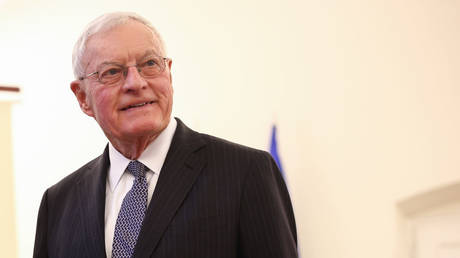 Trump envoy reveals NATO troop deployment plans for Ukraine
Trump envoy reveals NATO troop deployment plans for Ukraine
The remarks came as the French government struggles with an economic crisis. The national budget deficit hit 5.8% last year, once again surpassing the 3% threshold recommended for EU members. Public debt has climbed above 110% of GDP, and economic forecasts predict growth of less than 1% in 2025. Macron is also facing increased challenges in pushing legislation through parliament.
The TF1 broadcast opened with a montage of public criticism, including accusations that Macron has mismanaged the economy, treated ordinary citizens with contempt, and focused too heavily on foreign affairs. One citizen described him as “a president who practically wants to send us to war.”
Macron advocates for deploying French troops to Ukraine in the event of a peace deal between Kiev and Moscow, arguing that such a move could help deter Russia.
Moscow has repeatedly warned it would not accept any NATO presence in Ukraine, citing the military bloc’s expansion in Europe as a core reason for the conflict. Russia views the war as a US-led proxy campaign, with local troops serving as “cannon fodder.”
Direct talks between Russia and Ukraine, which Kiev called off in 2022, are expected to resume this week in Türkiye. Kiev has demanded that President Vladimir Putin participate in person and urged its Western backers to impose new sanctions if he refuses. Moscow has yet to confirm its delegation.
-
Site: Mises InstituteWhile Trump has not yet turned to price controls to address America‘s absurdly high drug prices, Monday‘s executive order suggests that he soon may.
-
Site: Catholic ConclaveChurch officials on the new Pope's time in Peru: "Active in providing relief during storms and during the coronavirus pandemic"Two church officials from Peru describe the new Pope Leo XIV as hands-on, energetic, and a mediator between conservatives and liberals. They know Robert Prevost from his time as a missionary and bishop. "Especially in the poor urban neighborhoods and rural areas, one Catholic Conclavehttp://www.blogger.com/profile/06227218883606585321noreply@blogger.com0
-
Site: southern orders
This pope is so clear and precise! No scratching of one’s head here!I have often spoken of Pope Benedict’s most wonderful Christmas speech to the Curia about the proper interpretation of Vatican II in continuity, not in a breach, with the Church prior to Vatican II.
Pope Leo has told us that he agrees with Pope Benedict’s elocution to the Roman Curia, not by words but by a major, major symbolic gesture, taking the name of Leo and specifically linking his papacy to one of the strongest pre-Vatican II popes of the late 1800’s to 1903, Pope Leo XIII!
If you had any doubt about this, read and watch Pope Leo’s very first Wednesday audience and the speech he gave to the bishops and laity of the Eastern Churches.
And, WOW!, what Pope Leo said about their Liturgy and how the Latin Rite’s new Mass has blown it. That implies the old Latin Rite was far more in continuity with the Eastern Churches’ Liturgy as it concerns Mystery and Prayer and Christ being the center rather than the personality of the priest!
Pope Leo is so clear in his discourses and teachings compared to Francis. And please recall how many times Pope Francis tossed his written text in order to give off-the-cuff gibberish! Pope Leo won’t do this in another break with his predecessor!
Pope Leo also speaks of the Eastern Church’s proper use of Synodality. This has implications too for how Pope Leo will refine the hot mess of synodality over the last 13 years in the Latin Rite!
Please note my comments in RED embedded in the Pope’s text:
ADDRESS OF THE HOLY FATHER LEO XIV
TO PARTICIPANTS IN THE JUBILEE OF ORIENTAL CHURCHESAudience Hall
Wednesday, 14 May 2025_________________________________
In the name of the Father, and of the Son, and of the Holy Spirit. Peace be with you.
Your Beatitudes, Your Eminence, Your Excellencies,
Dear priests, consecrated men and women,
Dear brothers and sisters,Christ is risen. He is truly risen! I greet you in these words that Eastern Christians in many lands never tire of repeating during the Easter season, as they profess the very heart of our faith and hope. It is very moving for me to see you here during the Jubilee of Hope, a hope unshakably grounded in the resurrection of Jesus Christ. Welcome to Rome! I am happy to be with you and to devote one of the first audiences of my pontificate to the Eastern faithful.
You are precious in God’s eyes. Looking at you, I think of the diversity of your origins, your glorious history and the bitter sufferings that many of your communities have endured or continue to endure. I would like to reaffirm the conviction of Pope Francis that the Eastern Churches are to be “cherished and esteemed for the unique spiritual and sapiential traditions that they preserve, and for all that they have to say to us about the Christian life, synodality, and the liturgy. We think of early Fathers, the Councils, and monasticism… inestimable treasures for the Church (Address to Participants in the Meeting of Aid Agencies for the Oriental Churches [ROACO], 27 June 2024).
I would also like to mention Pope Leo XIII, the first Pope to devote a specific document to the dignity of your Churches, inspired above all by the fact that, in his words, “the work of human redemption began in the East” (cf. Apostolic Letter Orientalium Dignitas, 30 November 1894). Truly, you have “a unique and privileged role as the original setting where the Church was born” (SAINT JOHN PAUL II, Orientale Lumen, 5). It is significant that several of your liturgies – which you are now solemnly celebrating in Rome in accordance with your various traditions – continue to use the language of the Lord Jesus. Indeed, Pope Leo XIII made a heartfelt appeal that the “legitimate variety of Eastern liturgy and discipline... may redound to the great honor and benefit of the Church” (Orientalium Dignitas). His desire remains ever timely. In our own day too, many of our Eastern brothers and sisters, including some of you, have been forced to flee their homelands because of war and persecution, instability and poverty, and risk losing not only their native lands, but also, when they reach the West, their religious identity. As a result, with the passing of generations, the priceless heritage of the Eastern Churches is being lost. (This has happened to the Latin Rites by way of a liturgy committee of Pope Paul VI and modern liturgists after it who have completely dismantled the liturgical patrimony of the Latin Rites!)
Over a century ago, Leo XIII pointed out that “preserving the Eastern rites is more important than is generally realized”. He went so far as to decree that “any Latin-Rite missionary, whether a member of the secular or regular clergy, who by advice or support draws any Eastern-Rite Catholic to the Latin Rite” ought to be “dismissed and removed from his office” (ibid). (My friends this has implications for those who are being forced today to abandon the patrimony of the Liturgical pre-Vatican II Church by a bishop of Rome as well as other bishops who force them to be accompanied to the modern rites of the Church!) We willingly reiterate this appeal to preserve and promote the Christian East, especially in the diaspora. In addition to establishing Eastern circumscriptions wherever possible and opportune, there is a need to promote greater awareness among Latin Christians. In this regard, I ask the Dicastery for the Eastern Churches – which I thank for its work – to help me to define principles, norms, and guidelines whereby Latin Bishops can concretely support Eastern Catholics in the diaspora in their efforts to preserve their living traditions and thus, by their distinctive witness, to enrich the communities in which they live. (This is a bombshell, because Pope Leo could easily ask the Dicastery for Divine Worship to reexamine TC and make it more like SP and thus help Pope Leo support those who desire the older liturgies with bishops supporting this desire!)
The Church needs you. The contribution that the Christian East can offer us today is immense! We have great need to recover the sense of mystery that remains alive in your liturgies, liturgies that engage the human person in his or her entirety, that sing of the beauty of salvation and evoke a sense of wonder at how God’s majesty embraces our human frailty! It is likewise important to rediscover, especially in the Christian West, a sense of the primacy of God, the importance of mystagogy and the values so typical of Eastern spirituality: constant intercession, penance, fasting, and weeping for one’s own sins and for those of all humanity (penthos)! It is vital, then, that you preserve your traditions without attenuating them, for the sake perhaps of practicality or convenience,(INTELLIGIBILITY or SIMPLICITY?) lest they be corrupted (LIKE THE MODERN LATIN RITE?)by the mentality of consumerism and utilitarianism. (This is bombshell stuff folks, bombshell. It has implications for how Pope Leo will move the liturgies of the Church in the Eastern direction, even ad orientem, by recovering what was abandoned in our similar Latin Rite liturgies that are rooted in Eastern principles! I am thrilled that Pope Leo mentions the East’s emphasis on PENANCE, FASTING AND WEEPING FOR ONE’S OWN SINS AND FOR THOSE OF ALL HUMANITY! Look at the pre-Vatican II Mass and its constant reminder of our sinfulness, erased in the new rites, and our practice of fasting prior to 1966!)
Your traditions of spirituality, ancient yet ever new, are medicinal. In them, the drama of human misery is combined with wonder at God’s mercy, so that our sinfulness does not lead to despair, but opens us to accepting the gracious gift of becoming creatures who are healed, divinized and raised to the heights of heaven. For this, we ought to give endless praise and thanks to the Lord. Together, we can pray with Saint Ephrem the Syrian and say to the Lord Jesus: “Glory to you, who laid your cross as a bridge over death… Glory to you who clothed yourself in the body of mortal man, and made it the source of life for all mortals” (Homily on our Lord, 9). We must ask, then, for the grace to see the certainty of Easter in every trial of life and not to lose heart, remembering, as another great Eastern Father wrote, that “the greatest sin is not to believe in the power of the Resurrection” (SAINT ISAAC OF NINEVEH, Sermones ascetici, I, 5).
Who, better than you, can sing a song of hope even amid the abyss of violence? Who, better than you, who have experienced the horrors of war so closely that Pope Francis referred to you as “martyr Churches” (Address to ROACO, ibid.)? From the Holy Land to Ukraine, from Lebanon to Syria, from the Middle East to Tigray and the Caucasus, how much violence do we see! Rising up from this horror, from the slaughter of so many young people, which ought to provoke outrage because lives are being sacrificed in the name of military conquest, there resounds an appeal: the appeal not so much of the Pope, but of Christ himself, who repeats: “Peace be with you!” (Jn 20:19, 21, 26). And he adds: “Peace I leave you; my peace I give to you. I do not give it to you as the world gives it” (Jn 14:27). Christ’s peace is not the sepulchral silence that reigns after conflict; it is not the fruit of oppression, but rather a gift that is meant for all, a gift that brings new life. Let us pray for this peace, which is reconciliation, forgiveness, and the courage to turn the page and start anew.
For my part, I will make every effort so that this peace may prevail. The Holy See is always ready to help bring enemies together, face to face, to talk to one another, so that peoples everywhere may once more find hope and recover the dignity they deserve, the dignity of peace. The peoples of our world desire peace, and to their leaders I appeal with all my heart: Let us meet, let us talk, let us negotiate! War is never inevitable. Weapons can and must be silenced, for they do not resolve problems but only increase them. Those who make history are the peacemakers, not those who sow seeds of suffering. Our neighbours are not first our enemies, but our fellow human beings; not criminals to be hated, but other men and women with whom we can speak. Let us reject the Manichean notions so typical of that mindset of violence that divides the world into those who are good and those who are evil.
The Church will never tire of repeating: let weapons be silenced. I would like to thank God for all those who, in silence, prayer and self-sacrifice, are sowing seeds of peace. I thank God for those Christians – Eastern and Latin alike – who, above all in the Middle East, persevere and remain in their homelands, resisting the temptation to abandon them. Christians must be given the opportunity, and not just in words, to remain in their native lands with all the rights needed for a secure existence. Please, let us strive for this!
Thank you, dear brothers and sisters of the East, the lands where Jesus, the Sun of Justice, dawned, for being “lights in our world” (cf. Mt 5:14). Continue to be outstanding for your faith, hope, and charity, and nothing else. May your Churches be exemplary, and may your Pastors promote communion with integrity, especially in the Synods of Bishops, that they may be places of fraternity and authentic co-responsibility. Ensure transparency in the administration of goods and be signs of humble and complete dedication to the holy people of God, without regard for honors, worldly power or appearance. Saint Symeon the New Theologian used an eloquent image in this regard: “Just as one who throws dust on the flame of a burning furnace extinguishes it, so the cares of this life and every kind of attachment to petty and worthless things destroy the warmth of the heart that was initially kindled” (Practical and Theological Chapters, 63). Today more than ever, the splendor of the Christian East demands freedom from all worldly attachments and from every tendency contrary to communion, in order to remain faithful in obedience and in evangelical witness.
I thank you for this, and in cordially giving you my blessing, I ask you to pray for the Church and to raise your powerful prayers of intercession for my ministry. Thank you!
FOLKS THIS IS A BOMBSHELL SPEECH WITH IMPLICATIONS FOR HOW POPE LEO WILL REFINE OUR LATIN RITE LITURGIES AND KEEP IN MIND THE LATIN RITE HAS SEVERAL RITES EMBEDDED IN IT OBLITERATED BY REFORMS AND DESTRUCTION AFTER VATICAN II NEVER INTENDED BY VATICAN II!
-
Site: AsiaNews.itThe region holds vast reserves of these minerals, now highly sought after by the high-tech industry. Kazakhstan speaks of 'unparalleled deposits'. The European Union is working to foster suitable partnerships as a possible alternative to China for supplies. However, these efforts are hindered by underdeveloped technological infrastructure, which slows down the region's real prospects for growth.
-
Site: AsiaNews.itToday's Headlines:India denies trade concessions to the United States in the mediation of a ceasefire with Pakistan;China and Cambodia begin joint military exercises today;More and more young Chinese are spending time in rural "retreat homes;" Malaysian Prime Minister Anwar Ibrahim visits Russia.
-
Site: Mises InstituteIndia has the longest history of affirmative action programs in the world and they have become the center of heated controversy between two clashing viewpoints.
-
Site: RT - News
Military contingents from France, Germany, the UK, and Poland may be involved, Keith Kellogg has said
Washington is in talks with its European NATO allies about deploying military contingents to Ukraine as part of a possible post-conflict settlement, US President Donald Trump’s special envoy, Keith Kellogg, has said.
A group of European NATO member states has for months been seeking to muster a force to be deployed to Ukraine as part of a so-called “coalition of the willing,” purportedly in a post-conflict peacekeeping role. Russia has repeatedly warned it would treat any foreign troops on Ukrainian soil as legitimate targets, saying such a move could escalate the conflict.
Speaking to Fox Business on Tuesday, Kellogg said troops from France, Germany, the UK, and Poland could be part of what he described as a “resiliency force.”
“This is a force referred to as the E3, but it’s actually now the E4 – when you include the Brits, the French, and the Germans, and in fact, the Poles as well,” he said. Kellogg added the troops would be positioned west of the Dnieper River, placing them “outside the contact zone.”
“And then to the east you have a peacekeeping force, and what it would look like with a third party involved with that. So, you can actually monitor a ceasefire; we have this thing pretty well planned out,” he said.
The remarks come as preparations are underway for possible direct talks between Russia and Ukraine in Istanbul. Kellogg and Steve Witkoff, another senior envoy for US President Donald Trump, are reportedly expected to attend. Russian President Vladimir Putin on Sunday proposed conducting negotiations without preconditions in Türkiye on May 15.
Read more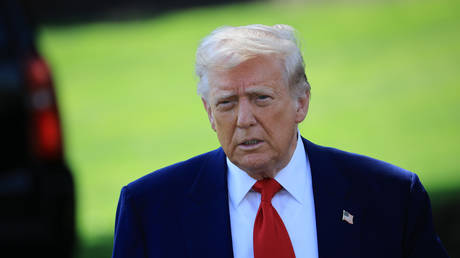 Trump could take part in Russia-Ukraine talks
Trump could take part in Russia-Ukraine talks
Vladimir Zelensky said he was ready to meet Putin on Thursday, but insisted that any talks should be preceded by the start of a 30-day ceasefire. Moscow has repeatedly ruled out this suggestion, saying such a pause would give Kiev an opportunity to regroup militarily and renew hostilities.
On Monday, the foreign ministers of France, Germany, Italy, Poland, Spain, and the UK, along with the EU’s top diplomat Kaja Kallas, issued a joint statement after talks in London. They pledged “robust security guarantees for Ukraine,” including “exploring the creation of a coalition of air, land, and maritime reassurance forces that could help create confidence in any future peace and support the regeneration of Ukraine’s armed forces.”
Russia has rejected the presence of NATO troops in Ukraine in any form. Foreign Minister Sergey Lavrov has said it would pose a direct threat to Russia. Security Council Secretary Sergey Shoigu has warned it could trigger World War III, potentially involving nuclear weapons.
-
Site: Rorate CaeliFrom Illinois, the following note from a priest: The former Fr. Prevost was an assistant pastor at St. Jude in New Lenox for a time, not far from where we serve. It is an Augustinian parish. The strong and firm consensus about him in this area is that he is smart, quiet, and kind.***The Priestly Fraternity of Saint Peter (FSSP) in North America has annual missions to northern New Catholichttp://www.blogger.com/profile/04118576661605931910noreply@blogger.com
-
Site: The Unz ReviewOn Monday, May 12, the United States pushed the Council of the International Civil Aviation Organization (ICAO), the aircraft safety watchdog, to vote behind closed doors to adopt a secret resolution convicting Russia of shooting-down Malaysia Airlines Flight MH17 on July 17, 2014. Unlike the Dutch show trial which in November 2022 convicted two Russians...

